Franchisee Multi-Unit
Zees and zors combine marketing efforts
Pioneers embrace emerging brands
2024 Multi-Unit 50 rankings

Retired captain serves pizza to the people



Zees and zors combine marketing efforts
Pioneers embrace emerging brands
2024 Multi-Unit 50 rankings

Retired captain serves pizza to the people




325+ Locations




*Per the 2024 Franchise Disclosure Document. The following figures are only estimates, and there is no assurance you will do as well if you rely upon our figures. If you rely upon these figures, you must accept the risk. Average gross sales are based on the gross sales reported by 211 locations, and average owner benefit is based on the unaudited operating statements supplied by the 146 locations open for the entire year ending December 31, 2023. Average owner benefit is calculated based on the 2023 year-end benchmark study from Item 19 of the 2024 Franchise Disclosure Document.
• Semi-Absentee: No

• Multi-unit expansion available nationwide
• Recession Resistant
"People are really embracing this concept in the salon industry and feeling confident bringing their business to MY SALON Suite. MY SALON Suite's franchise model has been a great way for me to learn, adopt and improve the proprietary processes, products and best practices. There's very valuable know-how and support for each step of the business from the start and continued through the growth."

Alpesh Trivedi, Franchisee Multi-unit franchisee in Michigan and Illinois

Streamlined, uncomplicated back-of-house with a gasless kitchen, no prep operation, and automated equipment.


















Ideally, franchisors and franchisees work in tandem to capture attention. Brands offer resources and advice while operators provide local market knowledge.
Without long histories of success, emerging brands can be risky. On the positive side, they provide a rich potential for growth.
The franchising landscape has witnessed a significant shift over the past decade, marked by a notable increase in multi-unit franchisee ownership.






- Jennifer Skomski

Space
After
Franchisee
Competitor
CHAIRMAN
Gary Gardner
CEO
Therese Thilgen
EXECUTIVE VP OPERATIONS
Sue Logan
EVP, CHIEF CONTENT OFFICER
Diane Phibbs
VP BUSINESS DEVELOPMENT
Barbara Yelmene
BUSINESS DEVELOPMENT EXECUTIVES
Kry stal Acre Jeff Katis
Judy Reichman
EXECUTIVE EDITOR
Kerr y Pipes
Retired captain has a new mission with Marco’s
COO’s business grows with his team
MANAGING EDITOR
M. Scott Morris
DIGITAL EDITOR Kevin Behan
WRITER AT LARGE
Eddy Goldberg
CREATIVE DIRECTOR
Cindy Cruz
Top U.S. brands by total and percentage of multi-unit franchisees
Help team members discover their strengths
New responsibilities require new types of preparation
Investing in emerging brands demands due diligence
Should you get stock tips from social media?
Zees and zors
Protect the ultimate American business model
Operators and emerging brands meet on the
Growing pickleball sector could be a smash hit
Impress new employees the moment they get hired
DIRECTOR OF TECHNOLOGY
Benjamin Foley
WEB DEVELOPER
Don Rush
WEB PRODUCTION ASSISTANTS
Esther Foley Juliana Foley
DIRECTOR, EVENT OPERATIONS
Katy Coutts
SENIOR
Sharon Wilkinson
SENIOR
Leticia
SENIOR
VIDEO
Chelsea
EVENT
Lillian
CONTRIBUTING EDITORS
Mary Lou Atkins John DiJulius
Jack Grespin
Matthew Haller
Larry Layton Carol Schleif
Paul Wilbur
CONTRIBUTING WRITER
Colleen McMillar
Article Inquiries editorial@franchiseupdate.com
Subscriptions subscriptions@franchising.com
Since 1962, we’ve been exclusively dedicated to economy lodging. With a simple business model and flexible PIPs, you can open quickly and profit faster than other economy brands.
ECONOMY. IT’S WHAT WE DO. See all 6 reasons to franchise with us.

One of the lowest initial franchise fees in economy lodging**
87% of owners want to open more locations*** Less cost to convert existing property****
©2024 G6 Hospitality IP LLC and G6 Hospitality Franchising LLP, 4001 International Parkway, Carrollton, Texas 75007, 972-360-5434. All rights reserved. This advertisement is not an offer to sell a franchise. An offer can only be made by means of a Franchise Disclosure Document that has been registered and approved by the appropriate agency in your state, if your state requires such registration. For Minnesota: Motel 6F-5053; Studio 6 - F-5052. *2021 FranData Benchmarking Analysis. **2022 G6 Competitive Benchmark Fee Analysis. ***Based on 2022 G6 Hospitality Owner Satisfaction Survey. ****2021 FranData Benchmarking Analysis.
As we prepare for the 2025 Multi-Unit Franchising Conference, I’m excited to extend a personal invitation to join us March 25–28 at Caesar’s Forum in Las Vegas. With a target of more than 2,000 participants expected, the conference promises to be an unparalleled gathering of franchisees and franchisors.
At the heart of every MUFC is the opportunity to build meaningful connections. In an industry as dynamic as franchising, relationships are key to success. The conference offers numerous networking events designed to foster collaboration and idea exchange. From casual meet and greets to structured roundtables, every interaction is a chance to expand your professional network and discover new opportunities.
Our educational sessions are tailored to address the challenges and opportunities unique to multi-unit franchising. We’ve curated a lineup of experts who will share their insights and experiences, providing you with actionable strategies to implement in your own operations. These sessions are more than just presentations; they’re interactive forums where you can engage with speakers and fellow attendees, sparking discussions that lead to innovative solutions. The exhibit hall is another fantastic space for networking. Here, you can explore the latest concepts, services, and lenders that are shaping the future of franchising. You can take the time

to connect with exhibitors and learn how their offerings can support your business goals. These conversations often lead to valuable partnerships and collaborations that extend beyond the conference.
As your chairman, I’m committed to creating a welcoming and inclusive environment. MUFC is not just a conference; it’s a community. Whether you’re a seasoned franchisee or new to the industry, you’ll find a supportive network of peers eager to share their knowledge and experiences. Our goal is to make sure you leave MUFC 2025 with new insights and strategies as well as new friends and business partners. We’re working diligently behind the scenes to ensure MUFC 2025 is our best conference yet. We’re lining up engaging sessions, dynamic speakers, and ample networking opportunities, and we’re confident that you’ll find immense value in attending. I look forward to meeting each of you and hearing your stories, challenges, and successes.
Join us in Las Vegas next spring for an unforgettable experience. Together, we’ll build the connections and collaborations that drive our industry forward.
Warm Regards ,
David Ostrowe
DAVID OSTROWE Chairman, MUFC 2025
The backbone of Dine Brands is our network of global franchisees.
Together, we are innovators that embrace new ideas, authenticity, and collaboration to unite franchisees, brands, and team members to go further together.
Thanks to that commitment, Dine Brands is uniquely positioned to grow new and future franchisees’ portfolios of the world’s most beloved restaurant brands.


3,500+ $2 billion
GLOBAL RESTAURANTS IN SALES (Q1 2024)

Explore nationwide franchise opportunities at dinebrands.com/brands
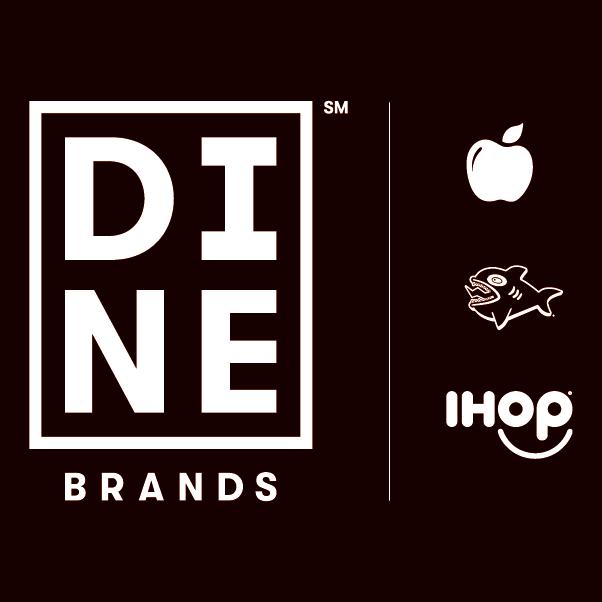
“Vision, ideas, and leadership are all parts of my innate drive. I pursued that several years ago and haven’t looked back.”
Space Cowboy gets “knee-deep in the pizza dough”
Written by KEVIN BEHAN

CEO
Company: Space Cowboys Restaurant Group
No. of units: 17 Donatos Pizza, 3 Guthrie’s Chicken, 2 Whit’s Frozen Custard
Age: 41
Family: Wife Sara, stepdaughter Caitlyn, 25, daughter Brooke, 12, son Bryson, 12
Years in franchising: 8
Years in current position: 8
Bill Aseere transitioned from a teenage dishwasher to the largest Dontaos Pizza operator. He has spent his entire career in the restaurant industry and drawn on that experience to build a multi-brand operation that includes three brands in his hometown of Cincinnati.
Aseere began working at LaRosa’s Pizzeria when he was 14 and enjoyed the experience so much that he continued with the company in various roles for the next 17 years. He eventually felt the entrepreneurial itch and partnered with two lifelong friends to start Space Cowboys Restaurant Group. They started with Donatos Pizza before adding Guthrie’s Chicken and Whit’s Frozen Yogurt.
The group currently operates more than 20 franchise locations.
“It has always been about relationships in the restaurant industry,” Aseere says. “That is with our employees, vendors, customers, and community partners. It is very rewarding to be involved with them. I am a type A personality and like to be in control. I guess I was destined to be an entrepreneur. Vision, ideas, and leadership are all parts of my innate drive. I pursued that several years ago and haven’t looked back.”
All of Aseere’s franchises are within 30 miles of the Cincinnati metropolitan area. It is a strategic decision to make an impact within the market and be a part of the community.
“I feel like we are combining the consistency of the products and services of a national franchise with also having a local presence,” he says. “We are committed to our staff and the involvement we have in the community. We’ve had opportunities to expand outside our region but have continued in our desire to stay local.”
Looking ahead, Aseere plans to continue to grow his franchise group and anticipates another 20 years in the role with the possibility of one day getting his children involved in the business.
First job: I started working at LaRosa’s Pizzeria as a dishwasher when I was 14.
Formative influences/events: I had the opportunity to do the work-study program in high school at Covington Catholic High School, which taught me at a young age about hard work and follow through. It also gave me the opportunity to go to a great school that provided an education and a work ethic that has translated into success as an adult.
Key accomplishments: Family-first leader, largest Donatos franchise partner, a member of the Independence, Kentucky, City Council for eight years, and VP of franchise development for Whit’s Frozen Custard Corporate.
Biggest current challenge: Combating inflation. The restaurant industry in particular faces rising prices on products along with increased wages for labor. Pay is becoming more
“We are committed to our staff and the involvement we have in the community. We’ve had opportunities to expand outside our region but have continued in our desire to stay local.”
competitive, and we have to keep up with these changes.
Next big goal: Continue growing the Whit’s franchise in Cincinnati and beyond.
First turning point in your career: I worked at LaRosa’s for 17 years and knew I wanted to be an entrepreneur. I decided to leave that job in 2015 and partner with two lifelong friends to form Space Cowboys Restaurant Group. We started with a Donatos Pizza franchise.
Best business decision: Going into business with my best friend since kindergarten, Mike Ash.
Hardest lesson learned: Trust but verify. I once gave blind trust to a manager and later learned he was stealing from the business I was overseeing.
Work week: As an entrepreneur, there is no answer to this question. No week ever looks the same. I support the team whenever and however they need me. It is something I enjoy. I like to say I get knee-deep in the pizza dough. It keeps me feeling like I know what is going on in the stores on a daily basis and helps me understand the perspective of our employees.
Exercise/workout: Walk nightly with my wife. It gives us time to talk about anything and catch up on life.
Best advice you ever got: “Take the best and leave the rest.” I have worked with many great mentors and influential people in my 25-plus years in the workforce. A mentor of mine told me once to take the best attributes in business leaders and leave behind anything you don’t like in regards to how they handle their businesses.
What’s your passion in business? My passion is to provide a life for my family that
I didn’t have growing up. My work ethic is relentless. I am driven by opportunity and financial freedom.
How do you balance life and work? Family comes first, so that’s an easy one for me. If I don’t have family obligations, work always takes priority.
Guilty pleasure: Playing poker.
Favorite book: Start with Why by Simon Sinek.
Favorite movie: “Rounders” and “Bad Boys.” What do most people not know about you? I was born in Florida, and I want to live in Florida again. I just have to convince my wife.
Pet peeve: I am a really good listener, so when people don’t listen, it frustrates me.
What did you want to be when you grew up? FBI agent.
Last vacation: I went to the CMA Fest in Nashville in June.
Person you’d most like to have lunch with: Michael Jordan.
Business philosophy: Be a people-first leader. I make sure I am constantly available to my team through calls, emails, and messages. I serve my team and care about them as employees and as people. I always want to see how I can help them.
Management method or style: Lead from the front. Be present in locations and help when needed.
Greatest challenge: Finding loyalty with employees. It can be difficult to find good employees in the restaurant industry. Many people view it as a stepping stone job instead of a career. It can also have a negative stigma with
long hours and rude customers. Our goal is to hire talented and loyal employees and build a strong culture.
How do others describe you? A hard-working, driven leader who is relentless and always thinking about the next opportunity.
Have you ever been in a mentor-mentee relationship? What did you learn? I have had plenty of mentors over my career and have learned most of the attributes I carry today. I was also a mentor for a local children’s home for teenage kids, and that was an amazing experience in humility and care.
One thing you’re looking to do better: Continue finding ways to make my employees more money while keeping the company profitable.
How you give your team room to innovate and experiment: We are very laid back on management staff and let them operate. We get involved when they aren’t hitting their goals. Otherwise, we let them run things like they want.
How close are you to operations? I speak to my brother, who is my VP of operations, daily. I check the bank accounts and company sales and labor each day, and I visit stores weekly.
What are the two most important things you rely on from your franchisor? Hard to put it to just two, but protection/buying power on products and a consistent brand across the locations.
What you need from vendors: Efficiency on deliverables and a fair price.
Have you changed your marketing strategy in response to the economy? How? 100%. We try to be value driven, and we also are more grassroots now tha n ever before.
How is social media affecting your business? We have a strong presence on social media, but we focus on the community and local partnerships to really grow the brand. How do you hire and fire? We try to hire from within/close contacts. We hardly hire “off the streets” with a hiring platform but will from time to time if desperate. People typically fire themselves in our company. They know it’s not working out and typically leave before we have to fire them.
How do you train and retain? Training and development have been the number one focus in our company in 2024. Reinvesting in our people to give them the resources to do their jobs better and more efficiently has been a major priority.
How do you deal with problem employees? We let our store managers have the conversation with them first, and then upper management and ownership get involved as next steps. We always criticize privately and give them a plan to improve.
Fastest way into your doghouse: Lie to me.
Annual revenue: We are a $25 million company.
2024 goals: Grow sales by 5% as a company and keep turnover as a company under 50%.
Growth meter: How do you measure your growth? Through sales growth, our GM and manager turnover being smaller than the year prior, and expanding our number of locations.
Vision meter: Where do you want to be in five years? 10 years? Where we are now but double every five years top line—whatever that is. That may not necessarily be just restaurants.
Do you have brands in different segments? Why/why not? Yes. We own three different brands because it helps us diversify during slow/busy times. We take great ideas from other brands and implement them across our company. It helps us in the community by offering more than one brand to the people we love.
How is the economy in your region(s) affecting you, your employees, your customers? The economy has been very trying the past two years because we own high-quality brands, which means we offer premium products. Premium typically means a little higher in price because you get what you pay for, and customers just don’t have as much money in their accounts as they used to because of inflation. People are trading quality for transaction. We understand that and are trying to stay creative to compete.
Are you experiencing economic growth in your market? We had a very strong 2023 while 2024 has been a little quieter on growth as customers retract on spend due to inflation/recession.
How do changes in the economy affect the way you do business? We always put ourselves in the customers’ shoes first to see how they are looking at our business and try to react from there. Since we are just franchisees, some decisions are outside of our control.
How do you forecast for your business? We typically take the past four weeks of sales and also look at last year’s trend and then analyze from there. We take into account sales events and local events and tie them all together for a good strategic sales game plan. What are the best sources for capital expansion? We love local, so we always try to build local banking relationships that we can lean on and grow.
Experience with private equity, local banks, national banks, other institutions? Why/why not? Yes. We deal with a local banker now who is always there to help us grow.
What are you doing to take care of your employees? We are trying to pay as much, if not higher, than anyone else in the same segment of the industry. We also offer full benefits and one of the most competitive PTO schedules I have ever seen in our area.
How are you handling rising employee costs (payroll, minimum wage, healthcare, etc.)? We try to hire the right people and then the pay takes care of itself. We are
big believers in less is more if the people are the right ones and do the job. We would rather pay four people higher who will do the job correctly on a given shift than six people at a lower wage who aren’t giving their full effort. What laws and regulations are affecting your business, and how are you dealing with them? We haven’t had any major issues with laws and regulations that have affected our business now that Covid has subsided.
The upcoming January 1, 2025, Department of Labor salaried requirements will cause some shake-up in our sector for sure.
How do you reward/recognize top-performing employees? We have great relationships with many of our local entertainment resources, including the Cincinnati Bengals, Reds, FC Cincinnati, and concert venues like Riverbend Music Center and Heritage Bank Center. We always try to reward our top people with tickets to those events.
What kind of exit strategy do you have in place? To be honest, an exit strategy has never really crossed my mind as I envision myself being pretty active in the day-to-day for another 20-plus years. I already see a strong entrepreneur mindset in my kids and have hope they will carry our company on if and when that time comes. I know my business partners also have younger kids who will hopefully want to carry the company vision on as well.

A restaurant company unlike any other.
The Inspire portfolio is a powerful combination of iconic brands that creates one of the most innovative opportunities in the restaurant space. Inspire o ers franchise owners access to a diverse portfolio of beloved, globally recognized brands covering all day parts. With more than 32,650 locations across 57 global markets, Inspire provides tremendous runway for growth.
$32.5B Global System Sales
$9B Global Digital Sales
32,650+ Global Restaurants
2,900+ Franchisees
410M Global Guests
Learn more about franchise opportunities at inspirebrands.com/franchising
57 Global Markets
Grow your portfolio with distinct, highly-valued brands.












































We have the franchises.




Seize the yay!




Hottest sports bar franchise of all time.




It's GO time.




Run on it.




The best at fast and fresh.



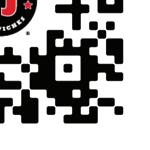
Live free, eat SONIC.




“I believe in constant learning and evolving through the process. The easiest way to learn is from people who have done it before.”
Franchisee’s American journey includes more than 200 units
Written by KEVIN BEHAN

Nadeem Saleem Bajwa overcame tragedy early in his life and applied a growth mindset to become an American success story while developing into one of the largest operators with Papa Johns.
and making deliveries. That first job gave him a sense of what life could be like in a new country.
“It was quite challenging, but I enjoyed it after everything I had been through. It was a huge culture shock for me at the time, but I was able to see firsthand how America is the land of opportunity,” he says.
Bajwa served as general manager and district manager for Papa Johns before opening his first franchise location in 2002. In addition to surrounding himself with a strong team, he credits the simplicity of the franchise model as a key to scaling his business. Today, Bajwa operates more than 200 Papa Johns stores with the goal of more than doubling that total in the future. He’s on his way. His newest signed agreement with the pizza brand includes a commitment to open an additional 50 stores over the next five years.
“I am always looking ahead and setting goals,” he says. “For me, the fun starts when you expand into multiple units, and you can see what you are building for yourself and others in the future.”
First job: My first job came in 1991 when I was 22 years old. I was a dishwasher and pizza delivery driver in Fort Wayne, Indiana.
Formative influences/events: My father suddenly passed away when I was in the fifth grade. He was the vanguard of the family, a man of vision and compassion. It was obviously devastating to me and my family. His passing placed a huge burden on my mother.
Company: Bajco Group
No. of units: 207 Papa Johns
Age: 54
Family: Wife, 3 daughters
Years in franchising: 22
Years in current position: 22
A Pakistan native, Bajwa was 10 years old when his father died. The loss placed a tremendous emotional and financial burden on the entire family. Although Bajwa didn’t have the grades to become a doctor as some of his siblings eventually did, he believed he had the skills to become a successful businessman.
He moved to the U.S. in 1991 and got his first exposure to the business world by working at a pizza restaurant. He handled routine tasks, such as washing dishes, mopping floors,
Key accomplishments: I co-founded and developed one of the most efficient restaurant management operations in the Papa Johns system with more than 200 units. I founded call centers, a tech company, and a construction business.
Biggest current challenge: Being able to balance quality and affordability for our customers. We want to provide an outstanding product with great ingredients while also doing so at an affordable price.
Next big goal: Reaching 500-plus Papa Johns locations.
First turning point in your career: When I opened my first Papa Johns location in 2002.
Best business decision: Becoming a Papa Johns franchisee. It has been a blessing, especially as an immigrant. The Papa Johns family is so welcoming and provides tremendous support for their franchisees. I never expected to own more than 12 stores, and I currently operate more than 200.
Hardest lesson learned: I was too focused on marketing when I opened my first location without preparing enough operationally. We did not provide great service, and I lost most of the crew as a result. I worked very hard to make it successful but learned you have to balance a lot when starting a new business.
Work week: Monday through Friday, which includes a couple of days for travel. I try to spend the weekend with my family and networking.
Exercise/workout: My goal is to get 10,000 steps a day.
Best advice you ever got: Manage your time well. Surround yourself with people who have the desire to win and groom them into your future leaders.
What’s your passion in business?
Growing my business. I thrive when being associated with talented, hard-working people and developing them into great leaders.
How do you balance life and work? Unfortunately, it is not as balanced as I would like it to be between family and business. I am blessed to have a great partner/wife and kids who understand that we are making this sacrifice for something great.
Guilty pleasure: Traveling and relaxing with family. We enjoy traveling internationally, especially to Pakistan and Istanbul, Turkey.
Favorite book: I actually prefer listening to audiobooks. I will read up on politics or restaurant industry news.
Favorite movie: “Training Day.” Denzel Washington is my favorite actor.
What do most people not know about you? I like being a bit nervous although I try not to show it. I feel a little bit of anxiety is not a bad thing. It keeps me focused.
Pet peeve: I feel I am focused on growth and constantly thinking ahead. I am of the mindset that I want things done yesterday. I don’t react well when people are not punctual or don’t plan and execute things in a timely manner.
What did you want to be when you grew up? I was never the best student growing up, and I knew I couldn’t become a doctor like several other members of my family. I thought I could eventually become a successful businessman, so that is where I focused my efforts. Last vacation: Last year I went on a trip to Pakistan and Dubai.
Person you’d most like to have lunch with: My mother, who still lives in Pakistan. She used to visit us once a year but can no longer travel. I miss her, and she has done so much for our family. I owe a lot of my success to her. Any minute I can spend with her, I try to do so.
Business philosophy: Without growth, it is just a full-time job. You need to enjoy what you do.
Management method or style: Visionary. You can’t just plan for your career and future. You have to surround yourself with great people and keep them in mind to be successful.
Greatest challenge: To develop a team over a long period of time. It is exciting, and I enjoy it. I often say that we are not in the pizza business but rather the people business.
How do others describe you? Disciplined and persistent. I set my mind on certain goals, and I continue to work until I achieve them.
Have you ever been in a mentor-mentee relationship? What did you learn? Not formally. However, I believe in constant learning and evolving through the process. The easiest way to learn is from people who have done it before.
One thing you’re looking to do better: Managing time with my family.
How you give your team room to innovate and experiment: I keep communication open and never stop them from bringing forth ideas to me.
How close are you to operations? As close as I can be. Without a good grip on operations, you can never be able to solve problems even if operational leadership is well placed to manage day-to-day. To grow, it is paramount to have an accurate pulse of current operations. What are the two most important things you rely on from your franchisor? Have a relationship built on trust and respect. In addition to having an established business model in place, any good franchisor should be open to feedback and collaboration. Franchisees
should be able to bring solutions to improve profitable growth.
What you need from vendors: To have a relationship in which we work like partners. Instead of just being a supplier, we should know our success is linked to each other, and we are working for our mutual betterment.
Have you changed your marketing strategy in response to the economy? How? Yes. First-party data is key to targeting different customer segments as needed. Papa Johns has heavily invested in technology, so we can target different customers through an easy-touse internal portal.
How is social media affecting your business? Social media is a very powerful tool and definitely impacts all aspects of our lives. For a business, it is a great way to quickly communicate with our customers. But it can impact negatively if not managed well. You must be careful to not use messaging or topics that would strike a negative tone with your customers.
How do you hire and fire? Attitudes often determine if someone will be successful in a given role. A positive attitude is an asset, and a negative one can be a destructive liability. How do you train and retain? It often starts with a good franchisor’s model, which includes training platforms. Teach people why the model is effective and efficient.
How do you deal with problem employees? By listening. I try to be flexible as long as it doesn’t negatively impact an organization’s discipline. I believe in giving people a second chance.
Fastest way into your doghouse: Losing focus from the main goal. We have the best product if we make it the right way. I can get upset if people lose track of the importance of providing a great product with great service to the customer.
2024 goals: Build more Papa Johns stores than committed to get ahead and continue our revenue growth. I recently signed an agreement to open an additional 50 stores over the next five years.
Growth meter: How do you measure your growth? Through sales, transactions, margins, development and acquisitions, and human resources.
Vision meter: Where do you want to be in five years? 10 years? I would like to double the size of my organization.
“In addition to competitive compensation and benefits, we always try to make the job fun and exciting for them. In order to have longevity, your team must feel they are contributing, proud of the work they do, and that they belong there.”
Do you have brands in different segments? Why/why not? I only operate Papa Johns franchises currently. I have looked at some others in the QSR space but have not felt comfortable with any other brand yet. Outside of QSR franchises, I own businesses in real estate, business process outsourcing (BPO), information and communication technology (ICT), and construction.
How is the economy in your region(s) affecting you, your employees, your customers? I have a presence in all regions across North America. Some areas have their own unique advantages and challenges that we have learned to deal with. This is why our local strategy is different in each market.
Are you experiencing economic growth in your market? We have seen a lot of construction and growth in certain markets, like Jacksonville, Phoenix, and Indiana.
How do changes in the economy affect the way you do business? Pressure on the consumer’s wallet does definitely add pressure on our margins. We offer a better product than any other pizza franchise, but we need to make sure the consumers can afford it.
How do you forecast for your business? We forecast for both the long and short term. In addition to looking at yearly or multi-year strategies, we are also examining goals over shorter periods of time, such as a monthly or quarterly basis or a seasonal promotion.
What are the best sources for capital expansion? I believe using equity and debt is the fastest way to grow.
Experience with private equity, local banks, national banks, other institutions? Why/why not? I have never worked with private equity. I am concerned about too much involvement or pressure on return. I use traditional lenders whom we have been working with from the beginning.
What are you doing to take care of your employees? In addition to competitive compensation and benefits, we always try to make the job fun and exciting for them. In order to have longevity, your team must feel they are contributing, proud of the work they do, and that they belong there.
How are you handling rising employee costs (payroll, minimum wage, healthcare, etc.)? With efficiency and automation. Papa Johns as a franchisor does a great job of bringing efficiencies to the table for its franchisees.
What laws and regulations are affecting your business, and how are you dealing with them? Any laws that raise the cost of running the business impact us. It isn’t easy, but we figure out how to adjust. We’ve been profitable whether the minimum wage was $4.25 an hour or $15 an hour.
How do you reward/recognize top-performing employees? Often through bonuses and raises. We also offer opportunities for their growth. We like to promote from within. I like having others in the business grow with me through the years.
What kind of exit strategy do you have in place? Right now, I am only focused on growth strategy. I am focused on building the organization by keeping in mind that individuals don’t last, but an organization can only survive if it is built with a strong foundation. This is the reason one of my main focuses is to develop leaders for tomorrow who can continue to grow the organization even after I am gone.


























“Recognition for a job well done, especially in front of others, goes a long way. ”
Written by KEVIN BEHAN

ALEX CARNEY Vice President
Company: TR Hospitality Group (Freddy’s Frozen Custard & Steakburgers) and High Plains Brew (7 Brew Drive Thru Coffee) No. of units: 10 Freddy’s Frozen Custard & Steakburgers (11 in August), 3 7 Brew Drive Thru Coffee
Age: 32
Family: Wife Shelby, daughter Henley, 4, sons Palmer, 3, and Quentin, 1
Years in franchising: 10
Years in current position: 3
While playing golf for Kansas State University, Alex Carney learned lessons that now serve him well in the business world more than a decade later. Traits like teamwork, discipline, commitment, humility, and resilience are as important for a golfer as they are for a multi-unit franchisee.
While still in school, Carney saw business opportunities all around him as national brands moved into his college town of Manhattan, Kansas. Carney, a marketing major, was intrigued by this growth and kept an eye on the development of franchise businesses in local communities.
Carney was no stranger to entrepreneurship. Several family members have owned businesses
over the years. His parents have operated a strategic marketing firm for the past three decades.
During his senior year, he met with several groups affiliated with national brands in his hometown of Wichita, Kansas. One of those groups was Freddy’s Frozen Custard & Steakburgers. Carney didn’t know much about the brand or the franchising process, so he researched the company and the business model. After meeting with the Freddy’s development team, he moved forward with his first franchise agreement.
Carney went through management training and oversaw a location in Kansas while his initial store in Nebraska was being built. He opened his Freddy’s with partner Ron Oberg in Lincoln to great fanfare. Carney, who was 24 at the time of the opening, and his partner quickly signed a development agreement for more locations. They will open their 11th Freddy’s restaurant this summer. The partners also operate three 7 Brew Drive Thru Coffee locations.
Reflecting on the first 10 years of his career, Carney says franchising has opened a wealth of opportunities and exceeded all his expectations. “Franchising has taught me so much, whether it was about the food and beverage industry or important aspects of operating a business,” Carney says. “I’ve had the opportunity to work with some great people and interact with many loyal customers. I feel like we are just getting started.”
First job: Associate at Wichita Country Club Tennis/Fitness Center when I was in high school.
Formative influences/events: I was a member of the Kansas State University golf team from 2011 to 2014. That experience taught me discipline, focus, and humility, which have defined my career over the past 10 years. Golf is a game of failure. The business world is also full of many ups and downs. My experience with the golf team taught me how to learn from setbacks and get up after being knocked down. I come from a family of entrepreneurs. My parents have operated a strategic marketing
firm for the past 30 years, which is where I got my professional start. My grandfather was in banking, insurance, real estate, and numerous other ventures. There are several other entrepreneurs in our extended family.
Key accomplishments: My family first and foremost. Building the infrastructure to grow our company from one Freddy’s location to 11 and easily adapt to 7 Brew development and operations.
Biggest current challenge: Giving quality time and attention to my team and my family while maintaining my focus on operations, development, and growth.
Next big goal: Complete current development agreements for Freddy’s (19) and 7 Brew (30).
First turning point in your career: The day we opened our first Freddy’s in Lincoln, Nebraska. We knew it would be welcomed, but we didn’t realize it would be overwhelmingly loved. We quickly signed a development agreement to add an additional five locations to our existing five-store agreement. We have since signed an additional agreement for locations in South Dakota and Iowa. Nebraska and South Dakota have been incredible states in which to do business.
Best business decision: Franchising. It isn’t what I thought it was going to be as a young graduate, but it turned out to be better than I could’ve ever expected. There are endless opportunities and incredible people.
Hardest lesson learned: Sometimes people leave no matter how close you are to them. I have been blessed to have high-quality team members and managers, and we became friends. In some cases, they worked at one of the stores as a path to go to something else that they are more passionate about. They might move closer to family or pursue what they studied in college. I’m always happy to see people move on and succeed, but their departure can sting when you are in an industry in which we work so many hours together. I am proud to have built many great relationships with the people who have worked for me over the years.
Work week: Splitting time between travel and office work Monday through Friday. Mostly family time on Saturdays and Sundays with a little bit of prep for the upcoming week on Sunday evenings. I like to walk into the office Monday morning not feeling like I have to play catch-up. This business doesn’t stop. Exercise/workout: I am working toward some strength goals through heavy lifting three
to four days per week. I am definitely not a morning gym guy, but I’ll sneak over to the gym over the lunch hour or on my way home from the office. I have worked really hard to focus on my strength this year, understanding that it leads to better performance at work, a clearer and more focused mind, and added energy for the three littles that await me when I get home. It also sets a good example for my team. Best advice you ever got: Pick a career that pays you while you sleep. Thanks, Pops.
What’s your passion in business? Business is fun! I came into franchising with no food and beverage experience. My tool belt now includes construction, development, real estate, management, accounting, and finance as well as being a part-time plumber, electrician, and handyman. How many other careers teach you so many diverse skills?
How do you balance life and work? I’m extremely fortunate. My wife, Shelby, has embraced my work schedule, ethic, and passion for business. We look at it as give and take. If we can sneak out for lunch on a Tuesday, dinner on a Thursday, or a quick weekend getaway to the desert, we’ll do it at a moment’s notice. The food and beverage industry is 24/7, and I love that. I focus on being with my family when it matters and the same for my businesses.
Guilty pleasure: I have several: a great ribeye steak, a glass of fine tequila, a quick nine holes of golf after dinner, or a Padron cigar.
Favorite book: I also have several. Most recently, I have enjoyed the James Reece series by Jack Carr. Some of my all-time favorites are Quench Your Own Thirst by Jim Koch, Never Finished by David Goggins, and Sideline CEO by Marty Smith.
Favorite movie: “The Lincoln Lawyer.” What do most people not know about you? Mostly, I’m an open book. I have chosen and thrive in a career that is full steam ahead even though it has always been my ambition to lead a quiet life. I have actually competed in a professional golf tournament on one of the development tours. Sadly, I didn’t make the weekend cut.
Pet peeve: When others are dishonest or not punctual.
What did you want to be when you grew up? A professional golfer. I played competitively from age 10 through college. I continue to compete in amateur events once in a while.
Last vacation: Las Vegas in May 2024. Person you’d most like to have lunch with: Entrepreneur and author Jesse Itzler. I’ve read Jesse’s book, subscribed to his newsletter, and listened to several podcasts in which he has been a guest. I think he is an excellent businessman. He swims against the current and helps push people to be their best. He is very passionate, and I love that.
Business philosophy: People will always have options. We have an opportunity to increase the value of the products we deliver by adding incredible, personable, and genuine hospitality.
Management method or style: I love to facilitate joy. When surrounded by high-quality individuals, the restaurant industry is a ton of fun and time flies by. I also value honesty. I have always been honest with my team, to a fault, because I know they will be honest with me in return. We have been focusing on bringing accountability back to the workplace because the hard conversations and the actions, in return, show the true character of the team. Greatest challenge: Trying to do everything at once. When you care about results as much as I do, you want to have your hand in everything. I can be a bit of a perfectionist and try to get involved in everything.
How do others describe you? Passionate, energetic, and enthusiastic.
Have you ever been in a mentor-mentee relationship? What did you learn? I’ve been lucky enough to partner with a lifelong family friend, Ron Oberg, in both Freddy’s and 7 Brew. He has given me incredible opportunities and taught me more than I could’ve ever imagined about business.
One thing you’re looking to do better: Focus on the details. I tend to try to do too many things at once and can miss the fine print. I’ve improved as my role has evolved, but there’s still room to grow.
How you give your team room to innovate and experiment: I love to try new things, so I am drawn toward people with big ideas. My team knows that I am willing to try just about anything, but we will quickly abort if we find that it isn’t solving the problem at hand. I also try to explain the “why” if their idea isn’t feasible. My team also knows they can shut down my bad ideas with no hard feelings.
“As a group, we are constantly discussing succession and strategically planning for the future. Personally, I have made it my mission to train up my team and implement processes and best practices to keep the train moving forward regardless of who is on it.”
How close are you to operations? You will definitely find me directing traffic at new store openings. And any given day, you can find me pulling shots of espresso at 7 Brew, making a Double Steakburger or Turtle Sundae at Freddy’s, or tidying up around the stores. I have to pull myself away because I love the operations and could do it every minute of the day.
What are the two most important things you rely on from your franchisor? Brand recognition and systems and processes to help improve the guest experience. Both Freddy’s and 7 Brew are emerging brands with an incredible support staff at the franchisor level. I don’t know how many other franchisees get texts and calls from their CEOs regularly to check in, give recognition, or ask for opinions. We are blessed beyond belief with the leadership from both brands.
What you need from vendors: Consistency and communication. We need our vendors to perform at the highest level at all times to ensure that we can do the same. Again, we have been very fortunate to work with some incredible vendors who will go out of their way to make sure we are successful.
Have you changed your marketing strategy in response to the economy? How? Absolutely! Growing up in marketing and having a passion for economics has helped me focus on the future of our brands. We just rolled out family night at Freddy’s where families can purchase adult meals and get kid’s meals for free on Tuesday nights. People are looking for value right now, and I want Freddy’s to be a part of the dinner discussion in every household on Tuesdays. For 7 Brew, we have focused on building our loyalty base with direct mail pieces as well as community outreach events, introducing the brand to new faces.
How is social media affecting your business? It is incredible and terrifying all in the same breath. Both brands have teams dedicated to social media who follow trends and get the brand in front of new consumers. On the other hand, we know that if we make a silly mistake, it could easily be a viral moment that destroys our reputation.
How do you hire and fire? We are looking for personalities and work ethic. I have always told my team that it’s more about the person than the resume. We hire people who we believe we can trust, have a great time with, and hold accountable if needed. When it comes to firing, I’ve learned some hard lessons. I have held on to folks I shouldn’t have, and it impacted us negatively for longer than it should
have. We try to identify the folks who need to be successful somewhere else and help them on that journey. We’ve seen people thrive after parting ways. Sometimes, folks just aren’t a good fit, and that’s okay.
How do you train and retain? We now have a director of training, and we couldn’t be more excited. We are focused on consistent systems and processes to ensure that everyone who walks through the door gets a fair shot by giving them quality training. Retention is difficult right now. We are focused on rewarding accomplishments, consistent communication, and training as well as having a fun/safe workplace. Additionally, removing the bad apples tends to keep the good ones around.
How do you deal with problem employees? I love face-to-face conversations with someone who’s having a bad day. Usually, there is an external cause that they didn’t have a chance to process before clocking in. If a team member is causing trouble consistently, I have a different approach. A good friend in the industry once taught me this method. We will pull the team member aside and ask them to go home and think about how much they want to work with us because their behavior isn’t reflecting that. We will then ask them to come back to their next shift with a positive mental attitude or let us know that they are going to take their talents elsewhere. It seems to work almost every time. Sometimes people just have bad days.
Fastest way into your doghouse: Be dishonest, tardy, or lazy.
Annual revenue: $30,000,000 (combined).
2024 goals: Open five 7 Brew locations. Open one Freddy’s and start on the next two.
Growth meter: How do you measure your growth? I have always measured it by seeing the growth in my team. If they aren’t growing, I’m not either. Our blooming development helps as well.
Vision meter: Where do you want to be in five years? 10 years? I want to build an empire. I would like to add more brands across more segments. We have a nucleus that can handle more; that’s when you know.
Do you have brands in different segments? Why/why not? At the moment, we are in the QSR better burger and coffee segments. They complement each other well, have similarities that make operations flow, and are both targeting the daily consumer.
2022 was our year of strategy. 2023 witnessed the grand opening of exciting new locations. And now, get ready to soar with us into the global spotlight in 2024!




























Picture yourself at the helm of a brand that shapes the landscape and spearheads the industry.
In the year of global expansion, Hooters stands out as the franchise of choice for 2024. Seize the opportunity to be a key player in this triumph and elevate your success story by owning multiple units.



How is the economy in your region(s) affecting you, your employees, your customers? Nebraska and South Dakota have been very strong since day one for us. We have seen a sentiment from our guests looking for value more recently. We are focused on not outpricing ourselves as well as making sure our teams are compensated fairly and comparably across the industry. The guests notice when we increase prices and mostly understand. As the wallet of the consumer gets squeezed, we know we have to differentiate ourselves to earn their business. Freddy’s and 7 Brew both offer products that are fresh, consistent, and desirable.
Are you experiencing economic growth in your market? Absolutely. The Midwest has been very good for business. Omaha, Lincoln, and Sioux Falls are a few markets that we are developing that have been growing at incredible rates. The suburbs that surround them are following suit, allowing us to add locations as well.
How do changes in the economy affect the way you do business? We are focused on hospitality, quality, and cleanliness. At the end of the day, coffee shops and burger restaurants aren’t going away. In the best economy and the worst economy, the QSRs that serve a great product in a clean environment with great hospitality will outlast the competition. How do you forecast for your business? Forecasting has been a big part of our budgeting over the past few years as margins have been slimmed. Fortunately, Freddy’s has a long record of sales data that tends to follow the same trends. 7 Brew is a little bit tougher. We are trying to pay close attention to our weekover-week trends until we have a few years of data to help us forecast. Both businesses are extremely consistent week in and week out.
What are the best sources for capital expansion? Although it may not be the best, we have always used private capital from a small network of individuals in the Midwest. It doesn’t always allow us to grow as quickly as we’d like, but our partners trust us and give
us free rein to make decisions without second-guessing us.
Experience with private equity, local banks, national banks, other institutions? Why/why not? We had a PE deal fall through near the finish line a couple of years ago. It taught us a lot and gave us a fresh perspective on how financiers view our business. We are always happy to meet with investment groups, but we’re thrilled with how things have worked out so far. We currently have a relationship with a regional bank in Kansas that has been more like a partner than a bank. They have been along for the majority of our journey and love the brands that we represent.
What are you doing to take care of your employees? We do the standard shoutouts for birthdays and anniversaries, etc., but I have realized that recognition for a job well done, especially in front of others, goes a long way. Everyone loves to hear “good job” from time to time. We also have a constant schedule of competitions and events that allow us to reward our teams for their efforts.
How are you handling rising employee costs (payroll, minimum wage, healthcare, etc.)? The margins are shrinking; there’s no doubt about that. Minimum wage has been tough to navigate with competitors consistently raising the bar to attract talent. Some brands are putting golden handcuffs on their team members just to retain staff by overpaying by 10–20%. We know that the best way to manage the personnel budget is through tenure. Tenured team members work smarter and faster. They waste less and give better hospitality to new hires. Both of our brands have an incredible track record with retention.
What laws and regulations are affecting your business, and how are you dealing with them? Like most QSRs, our managers are working more than 40 hours per week. As the Department of Labor continues to raise the minimum salary threshold, we will have to make some critical decisions on the structure of our operations. We are starting to plan
for the changes but haven’t made any critical decisions at this time. There is also a large population of kids under the age of 16 who want to get into the workforce. As an employer, there is more risk than reward for employing them. It’s too bad because that’s a great batch of prospective employees.
How do you reward/recognize top-performing employees? Our goal is to promote from within as we grow. Our top performers have constant opportunities to move up in our group. In the next 18 months, we will need 30–50 more managers, supervisors, and trainers. A passionate, driven person can make a great living managing a Freddy’s or a 7 Brew. Beyond promotions, a top performer may have their pick at the best shifts throughout the week, have a higher pay rate, or get the opportunity to travel to a new store opening.
What kind of exit strategy do you have in place? As a group, we are constantly discussing succession and strategically planning for the future. Personally, I have made it my mission to train up my team and implement processes and best practices to keep the train moving forward regardless of who is on it.








“We love doing business in California and will keep fighting for what is right to manage the complexities of the business.”
Written by KEVIN BEHAN

GHAI CEO
Company: Ghai Management Services
No. of units: 140 Burger King, 36 Taco Bell, 28 Popeyes Louisiana Kitchen Age: 39
Family: Wife Gubir, daughters Saanjh and Reyhat
Years in franchising: 14
Years in current position: 2
Harsh Ghai has made good things happen over the past five years. When he was profiled in 2019, he was the largest Burger King franchisee and operated more than 150 restaurants. Since then, Ghai has sold approximately 20 Burger King restaurants in the Midwest and focused his growth primarily in Northern California. He added locations as far north as the California-Oregon border and acquired high-performing stores in San Francisco and Sacramento. In total, he operates 140 Burger King restaurants.
Soon after Popeyes Louisiana Kitchen was acquired by Restaurant Brands International, Ghai purchased most of its restaurants in the Sacramento market as part of a 15-unit deal. It
was a full-circle moment for Ghai because his first experience with franchise ownership came with the chain shortly after he graduated from college. He recalls that he failed miserably and left the brand in 2012. Now, he’s optimistic about the growth opportunities with Popeyes and has 28 locations.
“We love the brand, and there is tremendous demand for chicken concepts,” Ghai says. “We are very excited about the growth opportunities.”
When he stepped away from Popeyes a dozen years ago, he stepped toward Taco Bell. Ghai has 36 Taco Bell franchises and plans to double his current count over the next three to five years.
“Being represented by three brands is very appealing to us,” he says. “It enables us to scale much faster that way. We need to have at least 50 units of each brand for it to make sense for us.”
On the personal side, Ghai and his wife Gubir welcomed a second daughter to the family last year. It’s a busy time as he balances operating more than 200 restaurants with raising a young family.
“There are a lot of ups and downs,” he says. “Owning a business and being my own boss is definitely helpful. It gives me a bit of freedom and flexibility. Having the support from my amazing wife and family helps as well. Our entire extended family lives close by, and that is very beneficial. We are fully invested in our children’s lives.”
During the past five years, Ghai navigated Covid and other industry challenges. As with most business owners, Ghai was forced to adjust his business practices on the fly.
“Our first reaction was to take care of our people and be sensitive to everyone’s needs,” he says. “We implemented hazard pay for our employees for the first three months, and we didn’t hesitate to shut down dining rooms or install shields between customers and staff to protect them. Every day was a challenge, especially in the first 45 days.”
As the country recovered from Covid, the restaurant industry faced a new set of issues that tested its operators. Many restaurants experienced severe staffing shortages after the
pandemic, stressing their ability to operate and serve customers. Since California recently raised its minimum wage to $20 per hour, owners are seeing new problems. Ghai says it was difficult to find employees last year, but open positions receive two to three times more applicants this year. The question now is how to find a way to pay those employees without hurting the bottom line.
Ghai is committed to tackling these issues head-on by working with local legislators and continuing to grow his business. “We love doing business in California and will keep fighting for what is right to manage the complexities of the business,” he says. “We are cautiously optimistic and believe we’ll come out stronger on the other side.”
First job: I first started working on weekends when I was 14 at the Burger King my father owned in Benicia, California.
Formative influences/events: My parents. As a second-generation franchisee and first-generation immigrant, I watched my father start from the bottom up to create the American dream. He put everything into growing the family business while my mom worked to help make ends meet. Their work ethic and commitment to education laid the foundation to help us to become successful.
Key accomplishments: Growing our family business portfolio from 20 units to 200-plus units since I graduated from college. In 2019, we were recognized as Burger King’s Global Franchisee of the Year. In 2023, we were again recognized as the brand’s North America Franchisee of the Year.
Biggest current challenge: Working through the tough legislative environment in California.
Next big goal: Achieving $50 million in company EBIDTA. We are almost there.
First turning point in your career: My entry into Taco Bell. I owned about 25 Burger King restaurants at that point. It was good to diversify into a good brand, and it solidified me as a multi-brand restaurant operator.
Best business decision: Diversifying into Taco Bell and Popeyes and focusing on established brands instead of emerging.
Hardest lesson learned: It can be tempting to jump into emerging brands, but they require a lot of time, focus, and capital, and many of them are not supported in the manner they should be.
Work week: Seven days a week with plenty of working vacations.
Exercise/workout: I start my morning with a workout and try to get in a long walk before the end of the day.
Best advice you ever got: It may seem simple, but “patience is a virtue.” I learned patience in business from my father.
What’s your passion in business? My passion is my people and my restaurants. I feel at home when I am in stores and interacting with the people who make us successful. Having relationships with team members and managers is very important to me.
How do you balance life and work? Having support from an amazing wife and family is very helpful. Since my wife also works in the family business, we find ways to support each other and raise our kids at the same time.
Guilty pleasure: I love sports, and I have a dangerous sweet tooth. I’m also a foodie and a sucker for a plated dinner.
Favorite book: Dune by Frank Herbert. Favorite movie: “Interstellar.”
What do most people not know about you? That I am from an immigrant family and did not live in the United States until I was 9 years old.
Pet peeve: Aggressive business tactics. I also learned from my father to find win-win solutions. While it is important to have the ability to be shrewd, you shouldn’t always feel like you have to get one over on another.
What did you want to be when you grew up? A businessperson. My father’s experience was in the hospitality industry, and I was always fascinated with the family business. I wanted to follow in his footsteps.
Last vacation: We just finished a quick trip to Cabo San Lucas and are headed to Europe in August with my entire family.
Person you’d most like to have lunch with: My grandfather, whom I never met.
Business philosophy: Taking care of your people. In restaurants, we are in the people business first. I consider myself a gardener who really just needs to water the plants.
Management method or style: Servant leadership.
Greatest challenge: Getting our team members and legislators to understand that we are a family business.
How do others describe you? Fun loving and innovative.
Have you ever been in a mentor-mentee relationship? What did you learn? Yes, my greatest mentors have taught me to be patient, deal in good faith, and build relationships.
One thing you’re looking to do better: I continue to strive to improve our people’s working experience.
How you give your team room to innovate and experiment: I try to allow leaders to make their own processes without weighing them down with busy work.
How close are you to operations? Very close. I try to visit restaurants at least once or twice a week.
What are the two most important things you rely on from your franchisor? Transparency, trust, and independence. Communication with the brand is always the key while they also need to allow us to operate with our expertise.
What you need from vendors: Timeliness and service. Some of our best vendors are small companies that provide excellent service and communication.
Have you changed your marketing strategy in response to the economy? How? Being malleable in marketing is extremely important. We went from the toughest supply chain environment where we took a lot of price increases to a big value moment where people don’t have money to spend on eating out. Our brands are adjusting very well.
How is social media affecting your business? Social media has been an amazing tool in recruitment and marketing. But it can also be dangerous, and restaurant teams need to be aware of this. These days, you cannot stop team members from posting on social media about their jobs, so it is important to educate them on the correct protocols.
How do you hire and fire? Now that California has a $20 minimum wage, we can hire from a much larger pool. We’re still adapting to this change, but it has a silver lining. Having a strong HR support team is extremely important, and I’m proud of the service they provide our restaurant teams.
How do you train and retain? Everyone is responsible for training, but our HR, safety, and finance teams are great at providing the support to train the field in their respective matters.
“Growth is measured through sales and EBIDTA but also through the growth of your leadership. We also grow our unit count by 10 to 20 units per year.
Developing new restaurants and our real estate portfolio is integral to our growth.”
How do you deal with problem employees? It is important to dig deeper into problems with employees. There’s usually a root cause that can be solved by discovering the underlying issues.
Fastest way into your doghouse: Not following directions.
Annual revenue: $410,000,000.
2024 goals: Maintaining our 2023 EBIDTA.
Growth meter: How do you measure your growth? Growth is measured through sales and EBIDTA but also through the growth of your leadership. We also grow our unit count by 10 to 20 units per year. Developing new restaurants and our real estate portfolio is integral to our growth.
Vision meter: Where do you want to be in five years? 10 years? $600 million in topline revenue in five years and approaching $1 billion in 10 years.
Do you have brands in different segments? Why/why not? They are all in the restaurant industry. We have burgers, tacos, and chicken. Always looking at pizza and coffee next!
How is the economy in your region(s) affecting you, your employees, your customers? With the changes in wages across all of California, we are still learning. We are now paying the same wages in Bakersfield and Redding as we are in San Francisco. It is a very tough environment.
Are you experiencing economic growth in your market? Many of our nonurban markets are experiencing growth.
How do changes in the economy affect the way you do business? We have to be able to shift our menu, prices, and deals as people have less money to spend on eating out. How do you forecast for your business? Our finance team does an incredible job of working with the field and anticipating nextgrowth levers for us. They work with our operations team on minute deals and figure all avenues for growth. I work with the finance team on a macro level regarding growth and adding new restaurants. There are a lot of opportunities with new acquisitions, many of which are underperforming units, and we turn them around.
What are the best sources for capital expansion? Our lenders are incredible. Lending is based very heavily on relationships. We have worked with our lead lender for seven years. We’ve seen him grow with the bank during the course of our tenure with him. Personal relationships are very important to us.
Experience with private equity, local banks, national banks, other institutions? Why/why not? We have great experiences with national banks like Fifth Third Bank, which is our lead arranger in all deals. We do work with some regional banks on smaller projects. While we have no private equity partners today, it is something we are exploring should there be a need with large growth. Right now, we enjoy being a family business.
What are you doing to take care of your employees? Money talks. You have to make sure they have financial security and a good work-life balance.
How are you handling rising employee costs (payroll, minimum wage, healthcare, etc.)? It’s a difficult time for this, but we are navigating it. Intelligent pricing and technology, like AI order taking, are going to be the key for us.
What laws and regulations are affecting your business, and how are you dealing with them? The California fast food legislation is our biggest focus not just at the state level, but also in local cities. We are also working on PAGA reform in California.
How do you reward/recognize top-performing employees? Growth is the biggest lever for recognition.
What kind of exit strategy do you have in place? No exit strategy yet! I have plenty of gas left, so it is full steam ahead.















Are you a seasoned franchise owner looking for your next big opportunity? Discover how Scooter’s Coffee® can complement and enhance your portfolio. Our industry-leading brand offers a strong opportunity for multi-unit franchise owners. Here’s why Scooter’s Coffee stands out:
Nationwide presence: Our coffee franchise is on the cusp of incredible expansion with over 750 locations across the country and plenty of territory still available.
Comprehensive support:
Our franchise partners bene t from extensive training, marketing, and operational support.
Multi-unit friendly:
Whether you’re already in the QSR industry or looking to join, our brand is ideal for owners ready to diversify their investments with multiple brands and locations.
Core values: Integrity, love, humility, and courage are the pillars guiding Scooter’s Coffee. These core values have shaped our brand’s journey, ensuring we stay true to our mission as we grow.
Award-winning brand: We’ve been recognized for excellence through various accolades, including Entrepreneur magazine’s Franchise 500, Franchise Times’ Fast & Serious, and USA Today’s Best Coffee Chain.
Community focused:
We do more than just serve specialty coffee; we serve smiles. Our brand values high-quality products, community connection, and customer loyalty.
Flexible models:
We have options for both traditional kiosks and new endcap locations to t any market. Our locations thrive in rural, suburban, and metro areas.
Strong reputation:
Our franchise network is home to many successful multi-unit owners.

“Give people a clear finish line to cross, give them all the resources they need to succeed, and then get out of their way.”
Multi-brand operator puts time to good use
Written by KEVIN BEHAN

Company: Imbue Capital
No. of units: 3 Crumbl Cookies, 1 PayMore Store, 1 Tropical Smoothie Cafe, 1 Rolling Suds, 1 ICX call center, 1 Solve Pest Pros
Age: 31
Family: Married, 2 children
Years in franchising: 6
Years in current position: 2
When Milo Leakehe was growing up, his father often recited mantras that he’d learned working as a child on a farm in Tonga: “Life isn’t fair,” “If you want something else, then work hard and go out and get it,” and “If it is to be, it is up to me.”
His father’s family didn’t always know where they would get their next meal. The elder Leakehe knew he wanted a different future, so he worked hard in school, earned a scholarship to Brigham Young University, and moved to the U.S. He later put himself through law school, eventually working as a counsel in the military’s Judge Advocate General’s Corps.
His father’s work ethic inspired the younger Leakehe during his childhood and into his career. His first job was selling pest control doorto-door, an experience he recommends to others as a way of learning to deal with frequent rejection. After following his dad’s footsteps to law school, Leakehe became intrigued by the idea of starting a holding company that owned and operated several different brands.
Leakehe partnered with Zach McKinley, and the two started franchising with Insight Pest Solutions. When they explored a franchise opportunity with Crumbl Cookies, they were rejected twice due to a lack of operating experience and available locations in their preferred territory in Utah. The partners called Crumbl three times a day for 35 days in a row to appeal the decision. Either impressed or weary, Crumbl leadership relented and approved their application. The two defied even their own expectations and were able to open three stores in six months, something Leakehe says is “probably the hardest thing I’ve ever done.”
Today, Leakehe’s holding company, Imbue Capital, operates five different brands with steady growth projected for the future.
First job: Abercrombie & Fitch while in high school (14 years old) in Salt Lake City. Professionally, it was with Vantage Marketing, going door-to-door selling pest control.
Formative influences/events: My dad grew up as a poor vanilla farmer in the South Pacific and eventually immigrated to America on an academic scholarship. Much of who I am is built on some lessons my dad often repeated: “Life responds to effort,” “Don’t be a victim of your circumstances,” “If you want something in life, go get it,” and “Anything is possible with hard work and sacrifice.”
Key accomplishments: Convincing my wife to marry me after trying to date her for 10 years. Graduating BYU Law School. Building and selling my first pest control business. Serving a two-year mission for the Church of Jesus Christ of Latter-Day Saints.
Next big goal: $30 million in revenue by December 31, 2032.
First turning point in your career: I took a class on mergers and acquisitions at BYU Law. A guest speaker gave a lecture about setting up a holding company to own various components of his business. At the same time, I attended a lecture on dental roll-ups. I put two and two together and realized how fun it would be to start a holding company that owned and operated various brands under the same parent company.
Best business decision: Partnering with Zach McKinley. Nothing is as valuable as having a great business partner who works as hard as you and approaches business with the same fundamental philosophy. Conversely, few things are as destructive as having the wrong partner.
Hardest lesson learned: You can’t pay your bills with EBITDA. Modeling is a great skill, but you must remember your cost of capital can be the difference between being a stable, profitable business or one that is constantly bleeding money.
Work week: 2024 is the first time since 2014 that I have been able to work consistent 30 to 40-hour weeks. The last decade has been consistent weeks of more than 80 hours. That’s partially because I’ve gotten better at delegating. Mostly, it is because the growth chasm between $2 million and $5 million is rough. Exercise/workout: Road bike four times per week and lift weights twice a week.
Best advice you ever got: Plan your life with purpose. Be intentional about how you spend your time. Living life without goals is like getting on a boat without ever grabbing the steering wheel: Where you end up is just a function of where the wind and the waves push you.
What’s your passion in business? I love the feeling of reaching a really hard goal I’ve chased for a really long time.
How do you balance life and work? When I’m at work, I am 100% at work. I work fast and efficiently. When I’m at home, I try to be 100% at home. It’s mostly a matter of setting up boundaries between the two and fighting off people who try to intrude on those boundaries. The most valuable part of my week is the two-hour weekly planning session where I plan and calendar my entire week.
Guilty pleasure: Online chess. I’m not really that good, but it’s a good way to give my brain a break from work.
Favorite book: I’ve been reading Simple Numbers, Straight Talk, Big Profits! by Beverly Blair Harzog and Gregory Burges Crabtree a lot lately.
Favorite movie: “Gladiator” with “The Count of Monte Cristo” a close second.
What do most people not know about you? I was mistakenly arrested by fitting the profile of a bank robber in Minnesota. Other than that, people who know me know that I am very much an open book.
Pet peeve: Inefficiency. I hate inefficiency, especially with time. Every minute of my day is tracked, so I can’t identify with those who waste time. We have 24 hours in a day, so we need to spend our time wisely.
What did you want to be when you grew up? A doctor. It offered money and a job in which I could help people.
Last vacation: My family and I go on vacation to the North Shore in Hawaii each year. Person you’d most like to have lunch with: Bill Ackman or Elon Musk.
Business philosophy: Build great businesses by building great people.
Management method or style: Delegate and elevate. Micromanagement is inefficient. Give people a clear finish line to cross, give them all the resources they need to succeed, and then get out of their way.
Greatest challenge: Balancing profits with rapid growth. No one tells you when you start how expensive growth can be. It is hard to find the capital to grow if you can’t show profitability, yet it’s hard to be profitable if your goal is to grow.
How do others describe you? Someone once told me that I remind them of a golden retriever. I have an endless supply of energy and enthusiasm. I’m a lifelong learner and feel very disoriented if I don’t have a crystal-clear goal. I spend two to three hours a week writing down my 20-year goals and reverse engineering the path to get to them.
Have you ever been in a mentor-mentee relationship? What did you learn? No, although that is arguably why I have gotten to where I am. I don’t think I knew a single business owner growing up, and so I experienced a lot of pushback when I opened up about my goals. If I followed the advice of most of my mentors, I would probably be a doctor or a lawyer right now.
One thing you’re looking to do better: I’m still trying to learn everything I can about retail marketing.
How you give your team room to innovate and experiment: One of the hardest leadership lessons to learn is being comfortable with some degree of failure. People will never learn if you hover over them and prevent them from ever making a mistake. We give our people a clear finish line they have to cross and a time they have to cross it. If they make a few mistakes along the way, we aren’t worried as long as they can course correct in time to hit the goal.
How close are you to operations? I have weekly pulse calls with every operating partner who reports to me. We go over the scorecard and issue list and review our goals. I delegate much of the operations to the operating partners. My primary responsibility now is to design the systems and resources that allow our operating partners to thrive.
What are the two most important things you rely on from your franchisor? Marketing and product development. The whole point of franchising is to focus on executing a proven system with a great product. What you need from vendors: Flexibility with payment terms. One of the bigger challenges of running a small business is managing the cash-flow cycle. It’s so nice when vendors offer flexible payment terms that allow us time to convert our inventory to cash.
Have you changed your marketing strategy in response to the economy? How? No. I haven’t felt the need to change. We had some concerns about consumer behavior during the pandemic. Since then, we have just followed the numbers, and the data hasn’t changed.
How is social media affecting your business? Social media is one of the greatest tools available to small to medium business owners. The ability to reach huge audiences at low cost is an incredible tool. That is especially true with the Crumbl brand, which receives most of its recognition through social media.
How do you hire and fire? Management is easy when you have people who manage themselves. I frequently reference principles from Jim Collins’ Good to Great with one of them being that great managers are good at getting the right people on the bus and the wrong people off the bus. So much of my success as a manager has been just finding really high-quality
people and filtering out people who just aren’t good fits.
How do you train and retain? It varies by brand. Employee turnover is high in the food industry. If you focus on quality people, they often train themselves and will stay around longer. Crumbl has a full-time area trainer who handles employee onboarding. Above all, I think you need to treat employees well to retain them. I believe in being generous and forgiving. When we have to let people go, both sides realize it needs to be done, and it is often amicable. Everyone always wants a raise, and I will try to give it to them before they ask.
How do you deal with problem employees? We have crystal-clear standards for each position. If someone is not hitting their expectations, we are very quick to communicate that and talk about what resources they need to succeed. Every now and then, we realize that circumstances have changed, and an expectation might be unreasonable. If someone is not succeeding with us after providing them all the resources they need, we are quick to have the conversation about this not being a winning relationship for either party.
Fastest way into your doghouse: Dishonesty. I can deal with mistakes, but the second someone is dishonest with me, things fall apart. I need to be able to trust people.
Annual revenue: $8 million.
2024 goals: We primarily focus on our 10year goals. However, by the end of the year, we expect to open two PayMore Store locations and two Tropical Smoothie Cafe locations. We will have five brands with operating systems open by the end of the year.
Growth meter: How do you measure your growth? Our overall growth goal is 30 small-to-medium units that each average $1 million in sales. We quantify it both in terms of physical units and their average revenue.
Vision meter: Where do you want to be in five years? 10 years? Our ultimate goal is to get to $30 million in annual revenue by December 31, 2032.
Do you have brands in different segments? Why/why not? Yes. Currently, we have two QSR brands, two home services brands, one tech company, and one B2B service provider. A lot of times, I have people
ask me why in the world we decided to spread ourselves over so many business segments. The most honest answer is that it is way more fun this way. Every day, I get to learn something new and learn how different businesses function. A more practical reason is that we get to cross-pollinate each business with the industry secrets we learn from the other businesses.
How is the economy in your region(s) affecting you, your employees, your customers? We saw declining revenues in Q4 of 2023 but have seen a really solid start to 2024. We were a little worried about the economy toward the end of last year, but we are very optimistic about what we’re seeing in each of our locations.
Are you experiencing economic growth in your market? Yes. Spending and customer optimism are up. We are very optimistic about business moving forward.
How do changes in the economy affect the way you do business? The biggest effect we feel from macroeconomic trends is our access to capital and the cost of capital. Raising money seemed to be a lot easier a few years ago. It’s still doable, but it requires a bit more legwork. Overall, I see this trend as a plus. It has forced us as operators to be better at P&L management, and it has weeded out some bad operators.
How do you forecast for your business? Primarily through modeling, although I laugh at it because it is pure speculation. We have a break-even analysis. On a monthly basis, we focus on the sales needed to keep the doors open. We are optimistic about America and the economy in general.
What are the best sources for capital expansion? Private credit is a very underrated form of capital. There are a lot of private lenders who are willing to lend without making you jump through all the hoops you see with traditional lenders.
Experience with private equity, local banks, national banks, other institutions? Why/why not? We’ve had a handful of private equity groups knocking at our door, but we have so far been able to avoid needing private equity. That may change one day depending on how large we want to scale. But for now, we’re very happy with our growth trajectory. We are only beginning to work with some regional banks for traditional financing.
Regional banks will probably become our preferred method as our businesses mature a bit. What are you doing to take care of your employees? Few things make me happier than hearing employees say, “I will work with you for as long as you’ll let me.” We really try to treat our people well, give them autonomy over their area of stewardship, and be patient as they grow. Our businesses are only as good as our people are, so we try to pay generously and treat them kindly.
How are you handling rising employee costs (payroll, minimum wage, healthcare, etc.)? This is really hard. Rising employee costs have forced us to be hyperfocused on productivity. We can’t afford to have anyone on payroll who isn’t producing efficiently. What laws and regulations are affecting your business, and how are you dealing with them? Pest control is one of the most regulated industries out there. There’s really no way around it other than knowing the rules and making sure you are following them. Making it work in a highly regulated industry is a pill you’ll have to swallow. It can also make you better as an operator. It can be a blessing because you know what your competitors are also doing.
How do you reward/recognize top-performing employees? We have biweekly scorecards and quarterly business reviews. We also recognize top salespeople in creative ways and have a March Madness-style sales competition.
What kind of exit strategy do you have in place? We have built and sold five pest control businesses. Although I don’t think we have any plans to sell any of our current businesses, the process was an incredible exercise in learning where and how value is created. The businesses fetching the highest multiples are—not coincidentally—the ones that are managed so well that the businesses aren’t dependent on the owner’s contributing labor. If you are trying to create the highest value business, you should focus on building a business that can run without you. If you can achieve that goal, then you have two great exit options: 1) Become a board member of your business and hire an executive to run the business in your absence, and 2) sell the business. We don’t have any plans to sell any of our businesses anytime soon. We don’t feel like we’ve succeeded until the business can run itself.





“We can’t be successful if people on our team don’t feel like they are a part of something. ”
Competitor couldn’t resist taking a risk
Written by KEVIN BEHAN
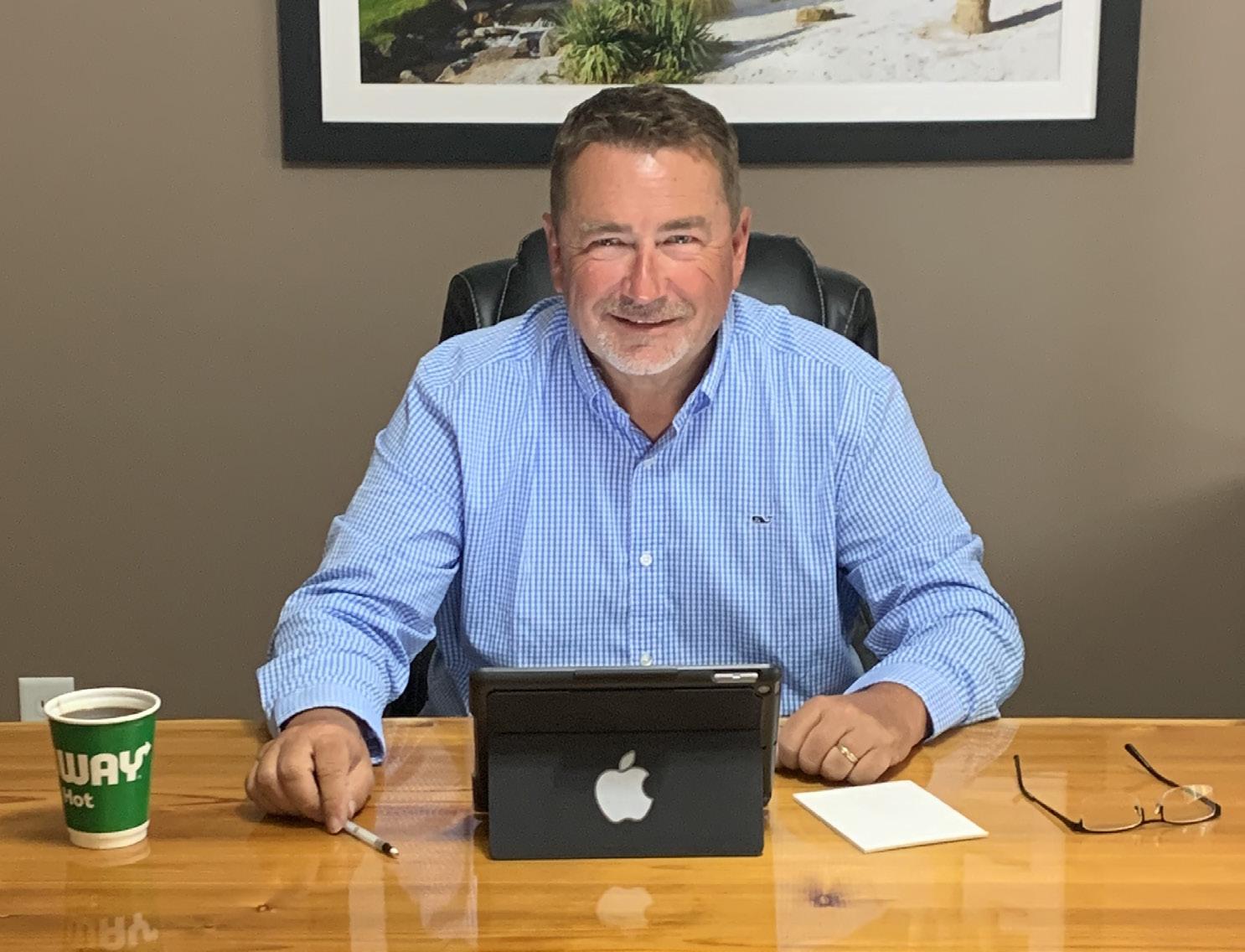
Franchisee
Company: Subway and Caribou Coffee No. of units: 3 Subway, 1 Caribou Coffee with 4 under construction
Age: 58
Family: Wife Michelle, son Michael, 26 Years in franchising: 23
Years in current position: 23
Bill Mathis isn’t afraid to take a risk in business, especially if it’s a concept he believes in.
When Mathis was working as a franchise consultant for Subway more than two decades ago, one of the company’s development agents said a restaurant in Crosslake, Minnesota, was about to close. He asked if anyone internally had an interest in buying it. Mathis knew the Subway concept was solid from his regular monthly visits to 35 Subway locations. He also knew the stores were profitable. He didn’t have direct experience operating a restaurant, but that didn’t stop the self-professed competitor from accepting the challenge.
“I had $500 in my bank account at the time, but I told him I was interested,” Mathis recalls. “I told my wife about it, and she thought I was crazy. But I knew how successful I could be with the Subway brand. The development agent I worked for at the time helped me with financing, and looking back more than 20 years later, it was the best business decision I made.”
Mathis’ gamble has paid off with a successful career as a multi-unit franchisee. In addition to operating three Subway restaurants in Minnesota, he is helping his wife following the recent opening of a Caribou Coffee store in St. Petersburg, Florida. They have four more locations under construction in the area.
In addition to being multi-unit franchisees, the pair are in the process of developing their own brand. They plan to sell custom-made baked pizza by the slice. The first Slice Nation is expected to open in Tampa in 2025.
The competitor and his wife are betting on themselves again.
First job: Snyder Brothers Drug Store in Apple Valley, Minnesota, when I was 16.
Formative influences/events: As a child, my parents made it a priority to attend Sunday school and church, learn the catechism, get confirmed, and learn and live the Ten Commandments. The belief in doing what is right was instilled in me at a young age. I’m also a very competitive person. I hate losing, and I really have no idea where that came from. I always felt disappointed if I lost playing Wiffle Ball or dodgeball as a young child. When I won, it was the best feeling. That competitiveness remains in me and carries into business.
Key accomplishments: Becoming chair of the North American Association of Subway Franchisees (NAASF) and vice chair of the Coalition of Franchisee Associations all in the same year.
Biggest current challenge: I am assisting my wife in bringing the Caribou Coffee brand to a new market in St. Petersburg, Florida. There are other more established coffee brands in the market, and we need to familiarize local customers with the concept.
“Do what’s right and stand by your principles. Treat people right and do unto others as you would have them do unto you. I’m a big believer in what comes around goes around. If you do right for someone today, that act will eventually come back to you at a certain point.”
Next big goal: My wife and I are co-founders of a new concept, Slice Nation, which offers custom-made and baked pizza by the slice. We are planning to open the first location in 2025.
First turning point in your career: When I decided to purchase my first Subway restaurant in 2001. I did not have much money at the time, but I knew from experience that it would be a profitable venture.
Best business decision: Moving from Minneapolis to the Brainerd Lakes Area to open our first Subway.
Hardest lesson learned: You can’t trust everyone. In the business world, some people will tell you one thing and do something else.
Work week: I work in some capacity nearly every day. I am frequently in communication with the stores and know the business and labor operations each day.
Exercise/workout: Playing golf.
Best advice you ever got: Get rid of debt as fast as you can and don’t be afraid to walk away from a deal.
What’s your passion in business? Seeing people on the team progress to new heights and make a career as a result of hard work and dedication.
How do you balance life and work? I struggle to completely separate myself from the business. When I do take a day off, I try to totally unplug and focus on other things unless an emergency arises.
Guilty pleasure: Chocolate chip ice cream with chocolate sauce, a load of whipped cream, and even more candy sprinkles with a cherry on top.
Favorite book: Anything written by Bob Rotella.
Favorite movie: “National Lampoon’s Christmas Vacation.”
What do most people not know about you? I was once a professional bass fisherman.
Pet peeve: People who are late and events that start late.
What did you want to be when you grew up? Pro basketball player.
Last vacation: The Bahamas in January 2024. Person you’d most like to have lunch with: My wife Michelle.
MANAGEMENT
Business philosophy: Do what’s right and stand by your principles. Treat people right and
do unto others as you would have them do unto you. I’m a big believer in what comes around goes around. If you do right for someone today, that act will eventually come back to you at a certain point.
Management method or style: I always want to hear the other side or see the other view before reacting in any way.
Greatest challenge: Handling stress. I often try to deal with it by taking a break and thinking about the best way to handle the situation. I may take a step back by going for a walk, reading about something else, hitting golf balls, or having lunch with my wife.
How do others describe you? Dedicated, honest, and a leader.
One thing you’re looking to do better: Balance my time. Ideally, I would like to play more golf and work less. Maybe be in the office four to five days a week.
How you give your team room to innovate and experiment: I encourage people to bring ideas, and when they do, I listen to them. How close are you to operations? I have a pulse of what’s going on every day. I check the metrics and sales numbers for each of our stores daily.
What are the two most important things you rely on from your franchisor? Communication and transparency. When it is good and they listen to franchisees, it becomes a magic formula. If you don’t have that, you have tense relationships, and it brings both sides down.
What you need from vendors: Having open communication and being transparent is also important in our relationship with vendors as well as getting the best price and service.
Have you changed your marketing strategy in response to the economy? How? Subway frequently offers discounts and promotions, but we are limited in the amount of marketing beyond that. Since we are bringing Caribou Coffee into a new market, we can be a bit more aggressive in discounting.
How is social media affecting your business? It affects all of us. One day, you think you have it figured out. The next day, something changes, and it’s almost back to square one. I do think people are getting a better pulse of how to best use social media today than just two or three years ago.

How do you hire and fire? Focus on hiring the right person. You can teach skills, but it’s much harder to teach personalities. We rarely fire as most employees eventually leave on their own.
How do you train and retain? I provide them the tools to perform and stand side by side with them. Retention often depends on the culture you create and how you treat the team. At the end of the day, income still does matter to team members.
How do you deal with problem employees? Document, coach, and repeat until they either correct it, feel this isn’t for them and leave, or we have to terminate their employment.
Fastest way into your doghouse: Lie to me.
2024 goals: Launch a concept in which my wife and I are co-founders. Work hard to form a strong relationship between NAASF and Roark Capital. Continue to assist my wife in developing Caribou Coffee locations in Florida.
Growth meter: How do you measure your growth? Growth can mean a lot of things, and it can be measured in different ways. I measure my personal growth by the positive impacts I make on the business today, this week, this month, and this year. We can’t be successful if people on our team don’t feel like they are a part of something.
Vision meter: Where do you want to be in five years? 10 years? In five years, slowing down and playing way more golf. In 10 years, I hope to do this interview again, which means I will have continued to grow and evolve my business.
Do you have brands in different segments? Why/why not? No, and I do not because the customer and your employee are different when you go from QSR to, for example, the hair-cutting industry. I would have to learn so many things all over. Do what you do best!
How is the economy in your region(s) affecting you, your employees, your customers? My team is receiving less in tips, and that might be a result of the economy, tipping fatigue, or both.
Are you experiencing economic growth in your market? It’s a slowdown but not one I’m overly concerned about.
How do changes in the economy affect the way you do business? Staffing levels can change quickly, and of course, how we invest back into the business is affected by the economy.
How do you forecast for your business? For established businesses, I use past performance in conjunction with what I believe will happen based on trends that I see in the community.
What are the best sources for capital expansion? Local or large banks.
Experience with private equity, local banks, national banks, other institutions? Why/why not? We have relationships with lending companies and local banks.
What are you doing to take care of your employees? I do whatever I can to make their jobs easier even if it’s something as simple as a labeling system or providing them with smallwares that make their jobs easier. Although some of those things come at a cost for me, they make the process easier and more efficient. It helps keep employees happy and leads to less turnover.
How are you handling rising employee costs (payroll, minimum wage, healthcare, etc.)? Many have raised menu prices. I have gone more than a year without raising prices, but we may need to raise prices soon. We try to be more efficient in scheduling and more productive with the work.
What laws and regulations are affecting your business, and how are you dealing with them? In Minnesota, the Earned Sick and Safe Time (ESST) and other laws are coming into play. We froze wages in 2024 as a result of ESST, which costs businesses real money.
How do you reward/recognize top-performing employees? We have employeeof-the-week and employee-of-the-month programs in place.
What kind of exit strategy do you have in place? Right now, all I think about is growth.









Stephanie Moseley
“You never know what life will throw at you, and most of the time, you just have to adapt.”
Written by KEVIN BEHAN

President
Company: Pisa Pie Enterprises
No. of units: 6 Marco’s Pizza
Age: 62
Family: 4 siblings, 6 nieces, 1 nephew, 1 grandniece, 2 grandnephews, and the handful of friends I call family
Years in franchising: 6
Years in current position: 6
Stephanie Moseley served in the U.S. Air Force and had a lengthy career as a pharmaceuticals and biotech rep before becoming a Marco’s Pizza franchisee at the age of 56. She’s now found a home with her six Marco’s locations in Virginia.
The daughter of a World War II Navy veteran, Moseley was inspired by his duty to his country and joined the Air Force ROTC while in college. After graduating, she joined the Air Force, hoping to become an air traffic controller. Instead, there was a need for an intelligence analyst. Moseley was tasked with developing a deep understanding of the military capabilities of the U.S. as well as its allies and adversaries.
This included developing a detailed knowledge of countries’ political structures. She studied military units and kept track of aircraft, tanks, missiles, and artillery.
“It was absolutely the toughest thing I went through in my life,” Moseley says. “I played with Barbies growing up, not G.I. Joes.”
Moseley served seven years in the Air Force and retired as a captain. When she transitioned into a civilian career, she became a pharmaceutical and biotech sales rep, providing scientific and clinical data to doctors to help inform their prescribing decisions. After years in the role, Moseley believed she could succeed as a business owner and began exploring her options.
One day, she saw a sign for Marco’s Pizza and got her first taste of the brand. She bought a pizza, loved it, and decided this was her opportunity to own a business. She now operates six Marco’s stores and named her company Pisa Pie Enterprises, a reference to Pisa, Italy, where she was born.
Moseley has taken what she learned from her father and her military experience and applied it to franchise ownership. She was named Franchisee of the Year by the International Franchise Association in 2021 due, in part, to her success in turning around an underperforming Marco’s store.
“There are so many lessons the military taught me that I apply to the business world today,” Moseley says. “I learned to identify a problem and think positively in coming up with a solution. I am steadfast in my resolution to find a positive outcome. When my first store struggled, failure was not an option. I won’t give up until the mission is complete.”
First job: My first official job was at Hardee’s while I was attending college, but I quickly pivoted to a career in the military. I became a captain and a U.S. Air Force intelligence analyst for seven years. In that position, I had Top Secret/Sensitive Compartmented Information (TS/SCI) clearance and was running a division that oversaw the highest and fastest-flying reconnaissance aircraft ever built.
Formative influences/events: Observing my parents successfully navigate their lives and rising out of the generational curse of poverty in the South. “We beat the odds” is how they described their success. This taught me that I could be successful regardless of any circumstance, and this is where my fighting spirit formed.
Key accomplishments: I have been honored to win several awards during my time as a franchisee. This includes being named the 2021 IFA Franchisee of the Year and a Women Franchisee Rock Star by Franchise Business Review. Both honor franchise owners who set exceptional examples for achieving success within the franchise model. Other awards that have meant a lot to me are the Marco’s Pizza Mike Jaynes Award and multiple President’s Club wins in pharmaceutical and biotech sales. Biggest current challenge: One of the biggest challenges I currently face is balancing work and life while working a full-time job and running multiple businesses. That is why it is so important for me to have a strong team to lean on for support in operating each business. I have invested in building a team with strong day-to-day operational qualities and can truly say that I can rely on them for support, management, and key decision-making.
Next big goal: I have six Marco’s Pizza locations open and operating, and I have a goal of opening 10 stores. By growing my portfolio and creating a great team of people to help run it, I am hoping to start moving toward retirement.
First turning point in your career: As an entrepreneur, it was turning my first store into a success. I did this by searching for a general manager who had knowledge and experience with pizza businesses to help me run my store and understand my vision. Investing in this position helped me turn around my store, increase sales, and become profitable, which led to my opening additional units.
Best business decision: Hiring my current chief of operations, Jason Gorman. I have learned a great deal from him about the pizza business and operations. When I was looking for a general manager in 2019, I knew I had to find the right person with the experience to help improve my business. I interviewed several candidates, but Jason stood out because he asked the right questions and was passionate about improving the store’s sales. He is irreplaceable and one of the reasons I have been so successful.
Hardest lesson learned: When something isn’t working, take immediate action to correct the course. Being able to identify the obstacle is the first step and the most important one. Once you see the problem, you can then break it down into manageable goals to move toward fixing the issue. Also, don’t be afraid to ask for help. It’s okay to lean on your support system to help tackle issues and get sound advice.
Work week: For most of my time as a franchise owner, I also balanced that with a fulltime job as a biotech account manager. I spend my evenings and weekends working on my Marco’s locations.
Exercise/workout: I try to squeeze it in, but with my schedule, it is very difficult. I focus on eating right, especially when I’m not eating Marco’s pizza, fried fish, ribeye steaks, and key lime pie. It’s all about balance.
Best advice you ever got: Always think positively and positive things will happen. It’s the secret to life. I try to remember that it’s natural to be fearful, but don’t let that get in the way. Look at each challenge as an opportunity for you to test your ability, grow your resiliency, and learn something new. By putting a positive spin on things, it will help put you in a mindset that will lead to positive things happening. What’s your passion in business? A passion I have in business is developing people into leaders and being able to help people. I have always had a passion for helping others, and I think it is important to lift up people around you in any way you can. Not only is developing great leaders great for my business because I have smart people helping me run it, but it’s also important to encourage them to grow as people as well. Watching employees grow into great leaders is very rewarding.
How do you balance life and work? That’s hard to do with running a business and working full time. I balance everything and ensure I get at least one weekend to myself per month to recharge and reenergize.
Guilty pleasure: A Marco’s Pepperoni Magnifico plus the addition of sausage, banana peppers, and jalapenos.
Favorite book: Dare to Lead by Brené Brown because it has shown me how to be a better leader to my team and in my business.
Favorite movie: “The Pursuit of Happyness.” It is a true story illustrating that no matter your circumstances and obstacles, you can overcome and triumph.
What do most people not know about you? When I was stationed in Okinawa, a friend and I got lost on the East China Sea in a paddleboat. There was a miscommunication with the lady who rented us the paddleboat, and we went too far past a coral reef. We were rescued by the coast guard, and it took an hour to get back to shore. This experience was one of many that taught me to be agile and resourceful. You never know what life will throw at you, and most of the time, you just have to adapt.
Pet peeve: People wasting my time. Time is an invaluable resource and something you can’t get back.
What did you want to be when you grew up? An actress. I was very interested in movies, and I thought it would be a very cool career. I wanted to have a role on my favorite soap opera, “The Young and the Restless”—one that wouldn’t be killed off!
Last vacation: Waldorf Astoria, Beverly Hills in 2023.
Person I’d most like to have lunch with: Tyler Perry, so I can gain insight into his tenacious ability to remain focused on success despite being homeless and being told no.
Business philosophy: If you treat your employees and customers right, pray, and make sound business decisions, success will follow.
Management method or style: Lead by example and train top management to do the same. Give people a little wiggle room to make mistakes without fear. That fosters an environment where ideas can flourish.
Greatest challenge: Maintaining profitability amid inflation, the rising costs of food and labor, and soaring interest rates.
How do others describe you? A force of nature, a grace under fire, a steel magnolia, fighting spirit, never-give-up attitude, and caring to a fault.
One thing I’m looking to do better: Keep frustrations and stress under control.
How I give my team room to innovate and experiment: I’m always open to suggestions. I give them the freedom to experiment without fear of being blamed if things don’t work out. I allow them to then pivot and flex their creative muscles.
How close are you to operations? While I’m not in the store every day, I consult with my chief of operations several times during the
day to ensure he, the general managers, and my marketing manager have what they need to operate successfully.
What are the two most important things you rely on from your franchisor? Support and true concern about my success. Have you changed your marketing strategy in response to the economy? How? Because of the economy, guests are looking for more value. I have pivoted my strategy to ensure my guest count continues to rise by offering value menu items without compromising on quality. We are laser focused on local schools and community organizations to become a part of the communities we serve by offering donations, fundraisers, and sponsorship opportunities. This is a great opportunity for us, positioning Marco’s as a goodwill community partner.
How is social media affecting your business? It does so in a positive way. Marco’s has a great social media outlet, and it’s a wonderful way to keep the brand top of mind among consumers and strengthen our relationship with the community.
Fastest way into my doghouse: Steal from me and let me catch it.
How did Covid-19 impact your business? While the pandemic was truly unfortunate, it increased revenue for businesses like Marco’s Pizza that were already operating in a delivery and carry-out business model to help feed people and families without fear of spreading Covid. The pandemic allowed guests to try Marco’s Pizza for the first time and realize the reason it was voted America’s Most-Loved Pizza in 2019.
How have you responded? I responded by ensuring our customer service was on point to give customers a first-class experience. I also contacted the local TV stations and media outlets to demonstrate the new concept of curbside pickup and contact-free delivery, offering a solution and resource for families in our community.
What changes do you think will be permanent? Curbside pickup because it allows customers the convenience of picking up their food without leaving the car.
Annual revenue: I have four stores generating
$1 million each in revenue and two units that we’re building up with a continued focus on marketing and customer service.
2024 goals: To open one more unit by the end of summer.
Growth meter: How do you measure your growth? I measure growth by comparing sales year over year, customer count trends, and customer satisfaction scores.
Vision meter: Where do you want to be in 5 years? 10 years? In five years, I would like a total of 10 stores operating successfully. I didn’t join Marco’s Pizza to just open one store; it has always been my vision to build my pizza empire. We have continued to grow steadily over the years, and I think 10 stores is the perfect goal.
Do you have brands in different segments? Why/why not? Not at the moment because I want to maintain a laser focus on growing with the Marco’s Pizza brand. Perhaps later I will explore that option for an even more robust portfolio.
How is the economy in your region(s) affecting you, your employees, your customers? Inflation is taking a toll on everyone and everything. It’s a major challenge just to keep up with the constant cost of goods increasing, but with the right team and support from the franchisor, we’re navigating the best we can and remaining profitable.
Are you experiencing economic growth in your market? Virginia has been a successful market for Marco’s Pizza. My locations in Newport News, Suffolk, Yorktown, Virginia Beach, and Fort Eustis, an Army base, have seen great growth since they opened. I have plans to open more locations in this market since it has shown great success.
How do changes in the economy affect the way you do business? The economy is constantly changing, so I am always considering that when making business decisions. The corporate team at Marco’s does a great job of helping franchisees prepare for these types of changes, and I use their resources and recommendations to help weigh my options.
How do you forecast for your business? I look at quarter-over-quarter and year-over-year sales to forecast the future. Our new MOMS POS system helps with that as well. I also use pizza trend analysis and what is going on in my local community and social media.
What are the best sources for capital expansion? Banks. Outside of friends and family, banks are the best way to secure money. They have different programs to get money, such as conventional loans and SBAs. With conventional loans offering shorter terms, you can get loans off the books quicker that way. That positions me to put more money in my pocket.
Experience with private equity, local banks, national banks, other institutions? Why/why not? I’ve had good experiences with Marco’s preferred lenders, like Osgood Bank. The rates are competitive and the application and approval processes are easier than other banks I’ve dealt with.
What are you doing to take care of your employees? I offer competitive pay, benefits, and paid time off. I also offer complete work flexibility to allow employees to enjoy work-life balance, which is so important to mental and physical health.
How are you handling rising employee costs (payroll, minimum wage, healthcare, etc.)? Like many businesses, we see a trend of increased costs in the economy, including employee wages. I currently offer competitive pay to make sure we are hiring top talent who are driven to grow in their roles. To manage these increased expenses, our team works tirelessly to find ways to increase profits and maintain a smaller group of employees.
How do you reward/recognize top-performing employees? I aim to celebrate wins both big and small to help motivate, inspire, and build a positive team culture. Whether it is a peer-to-peer callout, lunch outing, thank-you letter, or day off, I make sure to acknowledge the people who have played a significant role in bettering the business. I’m a big believer in letting your team know how much you appreciate their work and showing them their impact. In turn, it will result in increased motivation and energy.
What kind of exit strategy do you have in place? Keeping my businesses healthy for if and when I decide to sell.
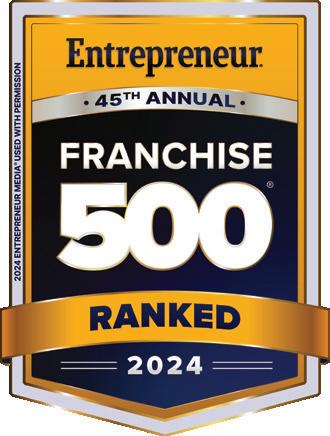




“Success is not only measured in profits, but in the positive effect we have on the communities we serve and the development we see in employees.”
COO’s business grows with his team
Written by KEVIN BEHAN
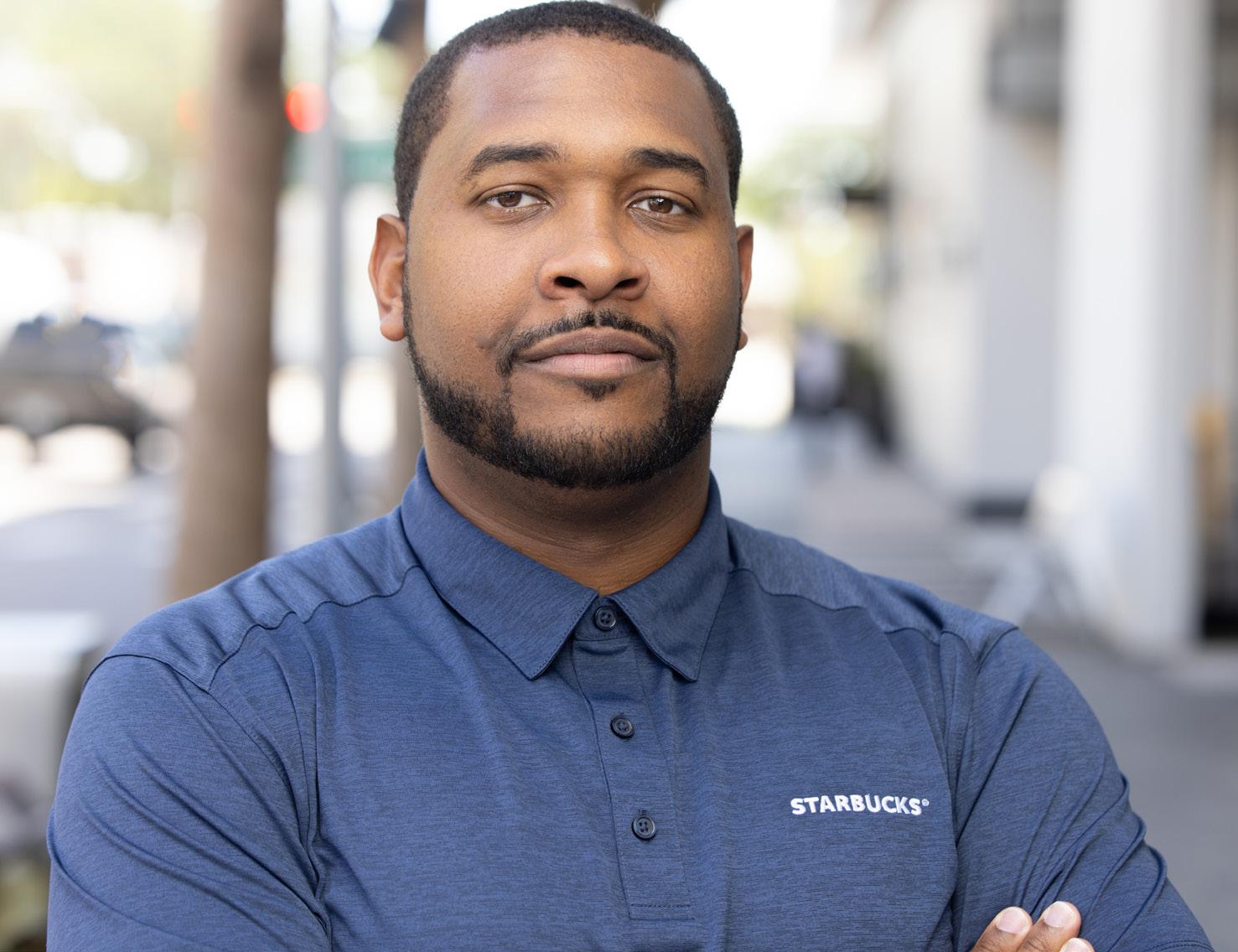
PCompany: Primo Partners
No. of units: 23 Ben & Jerry’s, 2 Starbucks Age: 33
Family: 2 siblings
Years in franchising: 11
Years in current position: 2
hillip Scotton makes it clear he is not in business just for himself. As COO of Primo Partners, Scotton hopes to help others realize and achieve their professional dreams. He is passionate about using his business to create the next generation of minority leaders through mentorship, coaching, and community activism.
Shortly after earning his master’s degree in higher education from the University of Pennsylvania, Scotton was introduced to the Ben & Jerry’s franchise by his friend and mentor Antonio McBroom, who was profiled in issue 3, 2023, of Multi-Unit Franchisee magazine. Scotton was involved with the brand
for about a decade before joining McBroom as an operating partner two years ago.
In his current role, Scotton often works six days a week and travels to his Ben & Jerry’s locations Wednesday through Saturday. Those visits give him the opportunity to interact with the staff and create a strong culture. He wants success not only for the stores, but for the people behind the counter.
“As a business owner, I am always looking to increase our profitability and grow within the market,” Scotton says. “More important to me, however, is my desire to have a positive impact in our community and in the lives of our employees.”
Scotton gives his staff opportunities to develop their skills and grow their careers. Many of his employees have climbed the ladder through internal promotions, going from an entry-level job to management positions. He believes that by empowering others to realize their dreams, he helps bring out the best in them personally and professionally.
By age 33, Scotton has made a major impact with his Ben & Jerry’s franchises, their community locations, and the lives of his employees. Looking ahead, he hopes to continue to help create the next generation of Black entrepreneurs who can share that philosophy with others.
First job: My first full-time position after college was as a school outreach officer for the nonprofit Leadership Enterprise for Diverse America. My work was focused on helping students achieve higher education, whether that was through mentorship programs or getting into Ivy League schools.
Formative influences/events: My father, Phil Scotton, has been a major influence in my life. As I was growing up, I saw my dad running his own barbershop and owning rental properties. This facilitated my desire to emulate his entrepreneurship. Antonio McBroom, a lifelong friend and mentor, was the one who introduced me to Ben & Jerry’s, showing me the opportunity in the franchising space. Without his support and encouragement to enter the
“Our primary goal is implementing a peoplefirst culture by closing the economic gap.”
field, I would not be where I am today.
Key accomplishments: As an organization, Primo Partners has been hitting key milestones in our growth and social movement. This past year, we have doubled the number of locations we have, and I am so proud to be one of the team members to spearhead this growth. Our team also raised $20,000 during our Free Cone Day celebration across all of our locations in April, and those funds will help a variety of local community charities, ranging from animal shelters to food banks. Personally, this past year I have been able to mentor four key team members to help drive their professional development to be the next generation of leaders within the QSR space.
Biggest current challenge: Finding the right people who understand and are willing to put in the time and energy to help the organization grow is one of our greatest challenges. We are constantly evolving and innovating, and our team members need to be nimble and willing to adapt as we grow.
Next big goal: Our primary goal is implementing a people-first culture by closing the economic gap. Our organization thrives on the mission of creating social mobility. We want to create opportunities for our staff to reap those benefits, become educated about entrepreneurship, and feel comfortable making that leap on their own.
First turning point in your career: When I attended graduate school at the University of Pennsylvania for higher education, I realized that I had a passion for teaching, coaching, and mentoring. It was also where I learned the importance of community activism, finding the intersection of nonprofit and for-profit businesses and applying that to our organization. Best business decision: Investing in the people on my team. This gave me the space to continually move the needle forward in other areas of the business.
Hardest lesson learned: Focus on the who but not the how. You can’t do everything alone, so it’s important to surround yourself with a team of driven leaders.
Exercise/workout: Peloton. It can be challenging due to travel. When I can keep it consistent, I try to exercise for one hour a day, four days a week.
Work Week: Typically, a six-day work week Monday through Saturday. On Monday, we focus on stand-up meetings, and Tuesday is for executive meetings. I am traveling to our physical locations from Wednesday to Saturday.
Guilty Pleasure: Pizza.
Favorite Book: Restavec: From Haitian Slave Child to Middle-Class American by JeanRobert Cade.
Favorite Movie: “Malcolm X.”
What do most people not know about you? That I am a power sports enthusiast. I enjoy motorcycles, ATVs, and boat races as a spectator and participant.
Pet peeve: When people don’t ask questions. Best advice you ever got: Invest in yourself and your team.
What’s your passion in business? Using our business as a vessel to build the next generation of minority leaders through mentorship, coaching, and community activism.
How do you balance life and work? Most people see it as 50/50, but in reality, work doesn’t have a set schedule. Some weeks, the balance might be 90/10 in favor of work, but other weeks, I might be able to focus on my hobbies. It is all about finding a job that you truly have a passion for and then those busy weeks feel rewarding rather than taxing. What did you want to be when you grew up? A doctor or a lawyer.
Last vacation: St. Barts in January 2024. Person you’d most like to have lunch with: Malcolm X. He was a dynamic figure, and knowing the background of his life has impacted me. He saw the world in a different light after being released from prison and became an activist. He was a visionary, and he represented the opportunity we all have in this world to be great. His example inspires what we strive to do as an organization.
Business philosophy: Success is not only measured in profits, but in the positive effect we have on the communities we serve and the development we see in employees.
Management method or style: I am a coach, mentor, and manager, striving to not just teach my employees their job descriptions, but truly work with them to develop leadership skills and traits.
Greatest challenge: My greatest challenge has been navigating the balance between growth and maintaining the schedule to prioritize team professional development.
How do others describe you? Others describe me as a passionate business leader who will go to great lengths for the success of the business and our staff.
Have you ever been in a mentor-mentee relationship? What did you learn? Antonio McBroom has been my mentor for many years and taught me three essential keys to my success. First, focus on the who, not the how. If you surround yourself with the right people, the how will come naturally. Hand in hand with that lesson is that you can’t do it all by yourself. Be an advocate for what you need and rely on those around you to help. Lastly, if what you are doing doesn’t bring you joy, don’t do it. Pursue ventures you have a passion for because it makes every day of work feel rewarding.
One thing you’re looking to do better: I am looking to be more open and share personal and professional goals with the leaders in my life as a way of inspiring them to vocalize their goals to me.
How you give your team room to innovate and experiment: We provide all our team members room to grow in our organization. Many team members have gone from scoopers in one of our locations to roles in management, regional leadership, and more. By giving them the confidence to pursue their professional dreams and the tools to achieve development, we open them up to a world of opportunities.
How close are you to operations? Our team remains heavily involved in day-to-day operations of our locations. While I cannot be onsite at every location each week, we continually are in contact with store leaders to collect updates. I personally carve time into my schedule to visit stores in my area on a frequent basis. What are the two most important things you rely on from your franchisor? We rely heavily on their leadership and management team for development and expansion guidance as well as innovation and creativity as it relates to new products, operations, marketing materials, etc.
How is social media affecting your business? I have been personally involved in building up our brand on social media for the past five years. A social media presence helps businesses like ours venture into new sectors and connect with like-minded individuals to share tips and guidance.
How do you hire and fire? Hiring is an essential part of our organization as we are always seeking talented and motivated individuals who want to drive our growth and mission forward. We are an equal opportunity organization, looking for candidates who demonstrate a passion for customer service, a willingness to learn, and a positive attitude toward teamwork and growth. Firing is always a last resort, and it only occurs after all other options, such as retraining, reassignment, or performance improvement plans, have been exhausted.
How do you train and retain? We are hands-on employers with multiple training programs in place to provide our employees with learning opportunities both pertaining to their job title and essential professional skills they can use in any organization. We are also a culture-driven organization, prioritizing our employees’ wants and needs. We see that retention is high in the organization thanks to the connections we have made with each member of our team.
How do you deal with problem employees? Identifying employees who are struggling is essential to running smooth operations. I believe that open conversations can truly help to identify the pain points with those employees and create an open line of communication to track improvement.
Fastest way into my doghouse: Not completing the simple tasks. There are multiple processes within our organization for a reason. Glazing over the small things can lead to bigger issues.
Annual revenue: $20 million.
2024 goals: My goal for 2024 is continued development with Ben & Jerry’s and other enterprises. We operate a dynamic and fast-paced organization and are always looking for new ways to expand the business, whether that is by physical locations or beating our previous sales record.
Growth meter: How do you measure your growth? I measure my growth in the development of those around me. As you grow, someone needs to grow into your space.
Vision meter: Where do you want to be in five years? 10 years? Ten years from now, I want to be leading a dynamic organization like Primo Partners for the social mission and passion rather than for income.
Do you have brands in different segments? Why/why not? Both of our brands fall into the food and beverage space. We find that they both align with our business ideals and our passion for community activism. How is the economy in your region(s) affecting you, your employees, your customers? Our markets have been prime territories for economic growth in recent years, making it exciting real estate for both franchisors and franchisees. With market analysis identifying Texas, Georgia, South Carolina, and North Carolina as strong economic markets that are receptive to new business, we see our locations in those states being high performing. When our stores are successful, our employees are successful.
Are you experiencing economic growth in your market? The food and beverage industry is exploding currently with new concepts being developed daily. While this explosion validates that the market is prime for the industry, it does make the industry more competitive. This competitiveness has forced brands to innovate faster than ever before with new unique menu items or store designs that can set them ahead of their competitors.
How do changes in the economy affect the way you do business? We find that during economic changes, our organization adapts to the ebbs and flows as seamlessly as possible. In the ice-cream industry, we see this almost every year due to seasonality. While being a part of a legacy brand can ease this burden, we use these times to reassess our priorities and focus on other facets of the business, such as community outreach and catering. That way we remain at the forefront of our communities’ thoughts.
How do you forecast for your business? This process involves analyzing historical sales data to identify trends and seasonal peaks to anticipate demand accurately. We also consider local events and promotions that might impact customer traffic and adjust our inventory and staffing levels accordingly. Additionally, we stay updated on industry reports and market research to make informed decisions about potential changes in consumer preferences.
What are the best sources for capital expansion? We explore small business grants and local economic development programs that support growth in our community. Additionally, partnering with investors who share our values and vision for the franchise can provide both financial support and strategic insights for expansion.
What are you doing to take care of your employees? At the core of our organization is the commitment to creating the next generation of entrepreneurs as we offer various leadership programs for our team.
How do you reward/recognize top-performing employees? Recognition is a top priority when employees are performing well. In a tight-knit organization like ours, we celebrate the big and small wins through internal communication. I find this praise builds confidence in our employees. We love to share our passion for food with the team, celebrating with dining experiences during milestone moments.

$2.6 MM average gross sales* (all stores… not just the top quartile)



*average of all stores open full year 2022

8-hour operating day 50% royalty reduction for first 2 years (for area development agreements signed by 12/31/24)
Written by AMBIKA OBEROI
The franchising landscape in the U.S. has witnessed a significant shift over the past decade, marked by a notable increase in multi-unit franchisee ownership. According to recent data from our franchisee database, there are approximately 42,900 multi-unit operators (MUO) in the U.S., collectively managing an impressive 241,380 units. This means that MUOs now control 56% of all franchised units, a testament to their growing influence within the industry. On average, an MUO today owns 5.5 franchised units, up from 4.9 units a decade ago. This increase represents an annualized growth rate of 1.1%, reflecting the steady expansion of multi-unit ownership.
The penetration of multi-unit ownership is not confined to a single sector; it spans both food and nonfood industries. QSRs lead the charge,
boasting the highest percentage of MUOs and the most units controlled by these operators as seen in this year’s MU50 ranking. Following closely are beauty-related concepts, indicating a broadening scope of multi-unit ownership across various sectors.
A noteworthy development within this trend is the rise of multi-brand operators, who now make up 13.8% of all MUOs. These franchisees are not just sticking to affiliated or sister concepts of major franchisor companies but are increasingly diversifying their portfolios across different categories and sectors. This diversification strategy highlights a more sophisticated approach to franchising, where seasoned brands are more inclined to sign development deals over single-unit deals, especially in specific industries.





South Louisiana moves at its own rhythm with a tempo paced by seemingly never-ending revelry: Mardi Gras in late winter, crawfish boils and music festivals throughout the spring, Essence Festival in the early summer, and of course, massive tailgate parties in the fall.
When the crews at Jason Dalton’s five Camp Bow Wow locations in metro New Orleans and Lafayette are brainstorming social media marketing plans, they know their posts need to reflect the area’s unique culture.
Scattered among the promo posts that might be found at any of Camp Bow Wow’s more than 200 locations in the U.S. pet enrichment activities are aimed specifically at local customers: Mardi Gras ball pits, “Mardi Paw Parades,” and “Swamp Pawty Pawrades.”
For patrons needing new refrigerator art, Dalton’s Camp Bow Wow locations are happy to help by offering a steady stream of photoshopped images with local twists. How about a paw print made to look like a crawfish, courtesy of your own “Paw-casso?” Or a photo of Fido in a Tulane University baseball uniform?
Dalton says he can’t rely on the brand’s national advertising alone to build his brand awareness and grow his clientele. His customers respond to a local touch.
“We do a tremendous amount of social media, mainly the big three: TikToks, Instagram Reels, and Facebook Reels. That’s where we find we get the best leverage, and we get the best leverage when we use customers’ dogs in those videos too,” Dalton says. “When corporate does a canned campaign, they push it down to all the franchisees’ Facebook pages.
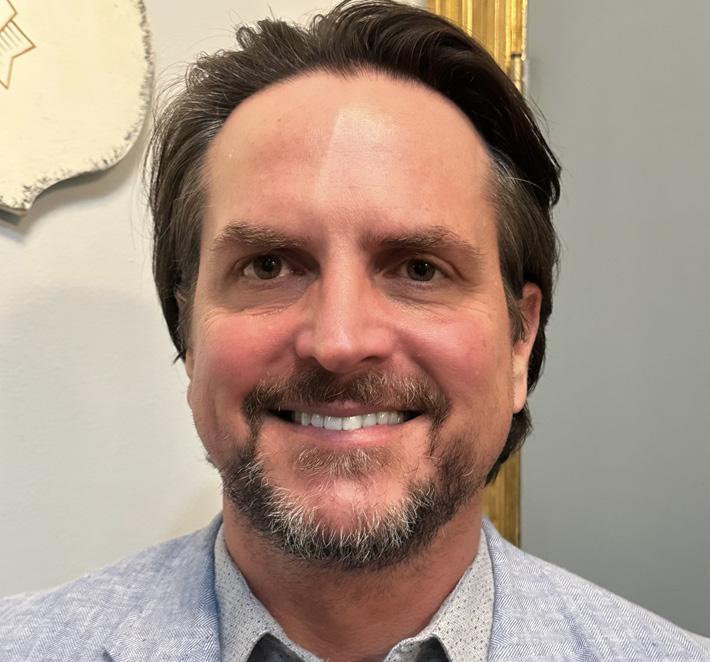
But it doesn’t have our customers, and it’s not even our camps. When we use our customers’ dogs, we can drive potential business to our Facebook page; we can drive it to our website. We can market intimately, which is why we love doing all of the various enrichments. Corporate does help us come up with some of the general ideas, but it’s the local team that puts together all the various events. And they get creative.”
Effective marketing is both science and art. Franchisors can provide resources and advice to franchisees, identify trends, and put together national marketing campaigns that bolster brand awareness and shepherd brand messaging. It’s up to franchise operators to tailor campaigns to their markets’ sensibilities. They build loyalty by knowing what’s relevant to their customers.
It often works best when franchisors and franchisees work in tandem to capture the attention of a public constantly bombarded with choices.
“Everybody wants that silver bullet, that one-size-fits-all. None of that seems to work,” Dalton says. He and his wife, Scarlett, also own Camp Bow Wow locations in Tennessee, Alabama, South Carolina, Florida, and New Mexico. “It seems to be more along the lines of there are a lot of little things that basically sum up your marketing effort as a whole.”
A Camp Bow Wow commercial on Hulu or YouTube TV will pique the interest of many potential customers. But Dalton has found he can increase that reach at the local level by sponsoring charity events and placing banner ads in a local football stadium.
“It’s all about those impressions, but there’s a critical mass that you have to get to before you actually start to see that return,” he says. “You have to open up a variety of different avenues to make sure that you’re broadening your scope to catch as many potential customers as possible.”
Lauren Johnson is the president of Quadcoast, a multi-unit franchise ownership group with four The UPS Store locations in the Cleveland area. As a franchise, The UPS Store is a well-recognized brand that Forbes magazine ranked No. 1 in customer service. Still, local stores can build on that reputation with their own efforts to market to consumers, Johnson says.
“The way we do this is by reaching them at many points in the consumer journey, using

LAUREN JOHNSON President Quadcoast
different forms of media to reach our targets,” she says. “My franchisor provides a marketing help center on our online hub, which provides easily accessible materials for me to utilize at a local level.”
Staff at stores in the same area collaborate to decide what efforts best serve all of them in terms of advertising. The corporate office provides franchisees with expert help.
“It can be a lot to try to understand Internet traffic and the complexities of options available to us via the different channels,” Johnson says. “The pros at the advertising agency, Doner, are provided to us as resources and guides for our big decisions on where our pooled dollars will go.”
For Jerome Johnson, who owns 23 locations of Sonic, Dunkin’, Baskin-Robbins, and Jersey Mike’s Subs, the most effective marketing strategy has been supplementing his brands’ national advertising with heavy community involvement.
His restaurants have formed partnerships with local Boys & Girls Clubs, Little League programs, churches, and schools. He sponsors teams, pays for jerseys, and allows organizations to hold on-site fundraisers.
“We’ve kept the same motto across all the brands as far as our local effort in the community. Our motto has been that we don’t want to be in the community, we want to be a part of the community,” he says. “When we first got into it, there was a local school nearby, and we started doing Spirit Night. Let’s say the band needs to raise funds for whatever reason. We have them come to our store—maybe on a Wednesday night for a certain amount of time—and they can promote their fundraiser,
and then we give them a percentage of the sales during that time they are there.”
His restaurants, all in the Virginia or Washington, D.C., area, host roughly 25 Spirit Nights every year. While the brands in his portfolio handle social media posts for his restaurants, Jerome Johnson also uses his own personal Instagram page. As he prepared to open his first Sonic in 2019, he documented the experience for his followers.
“Every time I went to the county building applying for some permits or every time I was on site, I posted it to my story. Doing so allowed people to walk with me and experience that journey and see what it took to actually open up a restaurant,” he says. “It created a lot of excitement for the first Sonic to come to Prince William County. And with all that exposure, local news started picking it up. It was all over the newspaper. And when the restaurant opened, the paper read, ‘Sonic opens with a boom.’ It had a photo of me smiling, holding a Cherry Limeade in my hand with cars wrapped around the building. It did wonders.”
That success, he says, was born out of the collaboration of his efforts and the brand awareness created by the franchisor-driven national campaigns. He’s quick to praise the resources and marketing support he receives from franchisors.
“On a local level, there’s a lot of flexibility for a franchisee to market in their territory,” he says. “The brands provide several marketing tools and ways for the franchisee to market their own stores. So, for instance, if you want to create a new coupon for your market, there’s a tool for that. If you want to create a banner,
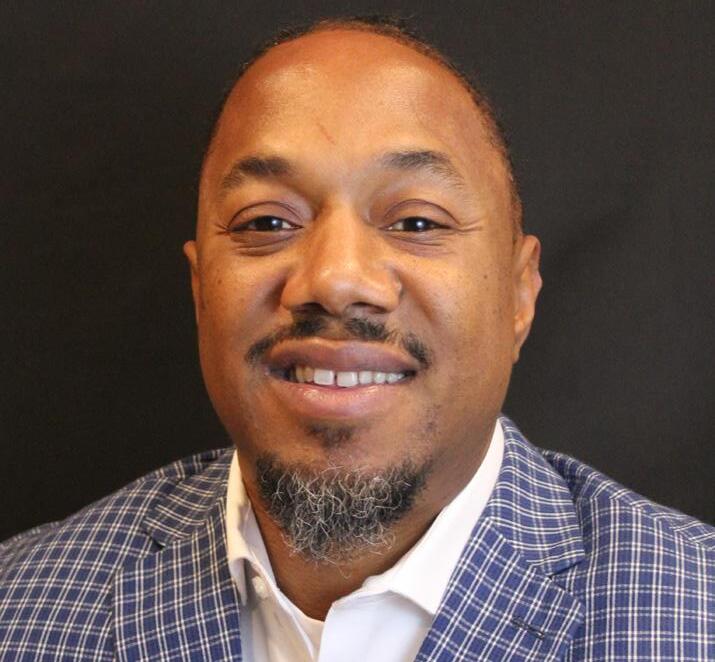
JEROME JOHNSON Multi-Brand Franchisee
there’s a tool for that. If you want to use wind wavers and things like that, there’s a site that’s provided that you can go to and purchase those wind wavers.”
According to Shamsu Charania, a good relationship and clear communication between franchisor and franchisee are the foundation of effective marketing and success in almost every other aspect of a franchise operation. Charania is the CEO of The Falcons Group, which has more than 90 locations of Dunkin’, TGI Fridays, Qdoba, and Checkers & Rally’s.
For national brands, much of the marketing is brand driven. “The bigger the brand is on a national level, the less it requires local marketing,” he says. But that doesn’t mean no local marketing is needed. Local partnerships with schools, hospitals, and food banks are important parts of the whole effort, he says.
Before launching the first-ever Checkers in Columbia, South Carolina, in June, the local team handed out flyers and set up preopening events to get the word out that the restaurant was coming. First responders were invited as well as friends and family.
The goal? To create a buzz and “to let them know about the brand and really give them a chance to taste the food and visit our location,” Charania says. “Even though they might have heard about the brand, they might not have tried it. So, these are the steps we are taking to make sure we are going to have a good presence in the market.”
When the franchisor identifies several areas where billboards might be effective, the local team will have the final say on the location. It’s all about collaboration, Charania says. “The best way I’ve found to be successful is building a good relationship with the franchisor and for the franchisor to be open to suggestions and to want to work with franchisees, which, fortunately, I’ve found is the case with most of the franchises I work with.”
Even with all the creativity that Camp Bow Wow franchisee Dalton and his team pour into local campaigns, he never underestimates the value and knowledge that the corporate office brings to the marketing mix.
“As a small business owner, you try to be all things to everybody,” Dalton says, “and it’s just impossible, in my opinion, to be really good at operations and also really good at marketing and growing your business. It helps

SHAMSU CHARANIA CEO
The Falcons Group
tremendously to have people whose expertise is in marketing teaching you how to set up your campaigns so that you’re getting feedback when you spend the money on marketing. They help a lot with our website. I don’t even have to fool with that. Everything that’s on our websites, as far as search engine optimization, as far as pay-per-clicks, they guide you through all that, which makes a huge difference. You don’t have to be jack-of-all-trades, master of none.”
Artificial intelligence tools are making it easier to market to a specific community, Dalton says, and the use of those tools will grow. Employing location data, AI predictive technology can give Dalton a pretty good idea of where his customers are coming from—down to the neighborhood—and what their behavior patterns are.
“Now, for example, if I wanted to invest in a billboard, I can actually pick the location that I want based on that. If we have 30% of our customers coming from this one particular subdivision, and they follow this path down this road, we would look to put a billboard somewhere on that particular road,” he says.
“I think it’s going to change the way we spend our money,” Dalton says. “If anything, it’ll allow us to focus our money more on things that work as opposed to throwing a bunch of spaghetti against the wall and seeing what sticks.”
































Local marketing can be at its best and most effective when franchisees and franchisors work together, especially considering both parties have skin in the game. It’s in the best interest of both parties to identify the right customers, reach them in the most efficient ways, and turn them into loyal customers. We asked four franchise marketing specialists to share some of their strategies and tactics for partnering with franchisees at the local level.
Vice President of Marketing
Any Lab Test Now is a direct access lab testing company that provides standard lab tests to consumers and businesses across the country. The brand works with ESite Analytics, a predictive analytics and location intelligence software, to provide each franchise owner with a site report of the demographics of their territories.
Along with the consumer demographic report, it also gives GPS mapping, trip data, and B2B information. Providing franchisees with this report allows them to see the nuances of each of their territories, which is helpful when deciding on the kinds of offers and promos they want to make.
Franchisees have access to tool kits with imagery and assets (all social platforms) for all demographics, SMS templates, email templates, and the ability to create LTO promo codes.
When owners really hone in on offers that appeal to their audience and take advantage of all their marketing channels, there’s a healthy return and engagement in those LTOs. Consumers are always looking for ways to save money.
SHANA KRISAN Chief Marketing Officer
At Goldfish Swim School, every franchise location, whether in development or already open, benefits from the dedicated support of a marketing consultant. These consultants assist locations in their specific territories by answering day-to-day questions, providing marketing-specific training for new hires, reviewing local marketing plans to offer feedback and recommendations, participating in ongoing monthly support calls, and more.
For existing schools, marketing consultants collaborate closely with each location’s franchise business consultant and curriculum consultant, ensuring comprehensive and integrated support across all departments. For new locations, the support begins as soon as the new franchise is ready to launch its website. It continues through the grand opening and beyond. Marketing consultants conduct a series of calls, training sessions, and visits (when applicable) to ensure the new location is set up for success and growth from the start.
We offer 20 digital marketing playbooks, available online in a secure, password-protected format, enabling easy access from computers, tablets, and smartphones. These playbooks cover
various aspects of marketing, including quarterly strategies, social media planning, new location launches, and B2B partnerships. Additionally, we provide cross-departmental playbooks, such as those focused on hiring, to give locations a comprehensive and holistic guide.
The digital playbook format enhances user experience and engagement through interactive features. These playbooks include embedded photo galleries and videos, links to approved vendor sites for easy ordering, connections to training modules for in-depth learning on specific topics, and much more. We’re also able to track adoption and engagement for any of our published playbooks.
As part of our comprehensive training program, we offer a two-day in-person session along with various online training modules for franchisees, managers, and marketing team members. These sessions cover all local marketing tactics and initiatives, teaching participants how to effectively apply them to their markets. Each training session includes interactive activities, teachbacks, and best practices discussions, ensuring trainees fully understand how to implement the information at the local level.
Consulting Chief Marketing Officer
Local community involvement is crucial for the success of any franchise. At WOWorks, which includes Saladworks, Frutta Bowls, Garbanzo Mediterranean Fresh, The Simple Greek, Barberitos Southwestern Grille and Cantina, and Zoup! Eatery, we understand the importance of connecting with the unique guests in each location and tailoring our marketing efforts to meet their needs. While we provide our franchisees with a range of customizable tools and resources to help them engage with their communities effectively, at the end of the day, they must take ownership of the process with our guidance.
Our franchisees play a key role in driving the business forward by drawing on their local expertise. Through our printon-demand site, franchisees have easy access to a variety of resources, from print materials to digital assets, to promote their restaurants with just a few clicks. However, it is essential for franchisees to actively participate in their communities and stay informed about local events, new competition, and relevant community groups to truly make an impact.
In addition to these resources, we have developed comprehensive 90-day local marketing plans for our restaurants to implement. These plans cover a variety of marketing tactics, including direct mail, social media, and digital advertising, and are designed to be easily executed at the local level. By staying involved in their communities and utilizing our guidance, franchisees can ensure that their restaurants remain top of mind for their guests.
Active and ongoing local marketing is proven to drive sales for restaurants, and our franchisees must take ownership of the process with our support to maximize their impact in their communities.
STEPHANIE JOHNSON Vice President of Marketing
PostNet understands the importance of providing marketing programs to support brand awareness and growth for franchisees in their local markets. The brand markets new openings and manages ongoing initiatives through a national ad fund. Here are the local marketing resources we offer our franchisees:
• We have a center marketing calendar that shares best practices each franchisee should be implementing on a monthly basis to market their business.
• We built an in-house digital marketing agency to support our franchisees with their local digital efforts.
• We consistently release new marketing collateral and assets that our franchisees can access 24/7 from our online platform, agEnterprise.
• All of our national awareness campaigns include marketing and sales assets that franchisees can download and use in their local markets.
• We use our marketing automation tool to send targeted emails to franchisee customers and prospects, such as lapsed customers, cross-selling campaigns, and awareness campaigns. Our franchisees are automatically enrolled in these programs unless they opt out.
• We use social media management tools to post to our franchisees’ social media pages multiple times a week. And they have access to it too, so they can schedule and post their own content whenever they wish.
• We have business development coaches who are out in the field consulting with centers on their local sales and marketing efforts.
The key to local marketing success lies in tailoring proven tactics to resonate with your customers and build relationships within your community. Here are some tips for crafting a winning local marketing strategy:
• Define your customer. It’s essential to know who your customer is and what their interests are. You want to know where they spend their time online and offline.
• Target your message. Craft your messaging around their interests. Make your business easy to find in their online searches and tailor your advertising to showcase how your product or service meets their needs.
• Get listed, get found. Ensure your business is listed prominently in local directories like Google Business and Yelp. It will increase your visibility in online searches and drive more traffic your way.
• Share online testimonials. Positive customer reviews are like gold for local businesses. Encourage satisfied customers to leave positive reviews and share them on your website and other social media platforms.
• Become a local fixture. Participate in and support local events, volunteer for causes you care about, and sponsor local initiatives. It builds brand awareness and helps make you a vital part of the community.
• Work with local media. You can still benefit from coverage in local newspapers and radio stations. These old-fashioned methods still get results, especially in smaller towns.
• Invest in local search. Platforms like Google Ads can create marketing campaigns that get results. Optimize your marketing spend with pay-per-click and other results-driven options.
• Embrace social media. Social media platforms offer a fantastic opportunity to connect with your local customers. Be on the channels your target market frequents and be engaged in conversations and share important information.
• Use contests and promotions. Creative contests and special promotions are excellent ways to attract and engage your target market. Try to tie prize promotions to local events and celebrations.
• Partner up. Team up with other local businesses for cross-promotional activities. This exposes you to a wider audience with minimal effort, allowing you to tap into their customer base and vice versa.
• Do the browser basics. Make sure whatever is on your website is mobile friendly. It needs to be optimized for smartphones and tablets for people on the go.
In today’s crowded marketplace, capturing the attention of your customers isn’t enough. You need to turn that initial spark into a lasting connection. Here are several key ways to ensure your customers are not just listening, but truly engaged:
• Be real. Authenticity is key. People connect with genuine interactions, so ditch the stale messaging and showcase your brand’s unique personality. Treat customers with respect and build trust through honest communication.
• Tap into emotions. Identify the emotional triggers that resonate with your target audience. Do they yearn for security? Do they crave a sense of community? Tailor your marketing to address those emotional needs.
• Transparency is king. Trust is the foundation of any strong relationship. Be open and honest with your customers. Keep them informed about updates, changes, or any issues that might impact them.
• Personalization is power. One-sizefits-all marketing is a thing of the past. Tailor your engagement strategy to be relevant to your customers. Target specific needs and interests and personalize their experience to build brand loyalty.
• Be where your customers are. Target your marketing efforts where your customers are spending time (i.e. social media). Don’t just market through Facebook or Instagram; comment on content your customers enjoy. It’s a simple way to promote brand awareness.
• Reward loyalty. Create fresh, new promotions and make it a point to reward customers.
If you use these customer engagement strategies, you’ll do a better job of engaging your customers and have a better chance of turning them into loyal customers and brand advocates.

BY
M. SCOTT MORRIS
Experienced franchisee Hemant Patel knew what he wanted and waited for it to come on the market. He ate his first meal at Cilantro Taco Grill about 10 years ago and was hooked on the flavors. As he traveled throughout greater Chicago, the restaurant was everywhere. Three or four years ago, he asked the owners if they were ready to start franchising.
“They said, ‘No, we don’t have the time right now,’” says Patel, who owns 11 Subway locations, nine ampm gas stations, and one Checkers & Rally’s location in Illinois.
He was willing to wait for Cilantro Taco Grill because the emerging brand had so many positives going for it. “I want to be part of some kind of authentic food. That means there is no fusion,” he says. “Another thing is it’s a new brand, so there is a potential to grow.”
Working with an established brand like Subway has its positives, including a long and proven history of profitability and high name recognition. “Subway is also very good at negotiating prices with the food vendors and equipment vendors, but they are bigger,” Patel says. “They can leverage. They can negotiate a very nice price.”
Patel says Cilantro Taco Grill excels in other ways. For instance, he has no restrictions on growing his portfolio. He plans to open 10 to 15 locations. The first is under construction in Sugar Grove, Illinois. “With an established brand, there is no potential for growth because they are everywhere,” he says.
Patel and others are willing to accept some risk if it means getting in on the ground floor of an emerging brand. A history of solid financial results from corporate stores, the vision of those in the C-Suite, and the support of the

team are important factors when signing with an emerging brand. In addition, franchise fees are often lower for newer brands than for established brands.
Another positive factor can’t be dismissed: Franchisees of emerging brands often have a passion for the product or service offered, propelling them through initial contact, due diligence, discovery day, and signing.
“If it’s a product you already believe in, it’s a product you find easy to sell,” Patel says. “You’re not a weird person, right? If you like eating this food, then obviously somebody else is going to like eating this food. Then it comes down to delivering the brand promise to the customers who come visit.”
A native of India, Patel appreciates the fact that the owners of Cilantro Taco Grill, Temoc Morfin and Armando “Pitbull” Pérez, are immigrants who came to the U.S. to build better lives for themselves and their families. He’s also impressed by how they’ve overcome numerous business challenges and streamlined operations for franchisees.
“They have a pretty good knowledge of running the restaurant, and that’s what I like,’” he says.
Cilantro Taco Grill helps with social media and other marketing. Patel can also rely on his years of experience as a restaurant operator to get the word out to potential customers. Since he’s already an established businessman in the area, he has connections with economic development professionals and city officials.
“I have to put in the effort that I know how to do,” he says, “and I’m going to do that because I like that product, and I think people are going to like it also.”
California-based Casey Furtado says he loved his time as a teacher, but an opportunity cropped up that he had to take seriously. In the wake of the Great Recession, job security was shaky. “Every year, it was like, ‘Hey, I don’t know if we’re going to have a spot for you in the teaching world,’” he recalls. “It was this interesting time when I was kind of looking at taking a risk. I was 28, and I was like, ‘Hey, if I’m going to take a risk, this is a good time to do it.’”
A friend recommended Apex Leadership Co., which helps schools raise money for bands, sports teams, and other programs. It

also provides leadership courses for young people. Furtado discussed the opportunity with his mentors, and he got to know Scott Donnell, founder of Apex Leadership Co. Furtado described Donnell as an “awesome dude, real creative, very entrepreneurial. I had many conversations with him over about a sixmonth period of time.”
He asked for the company’s business statements to learn Apex’s income potential. He also studied the leadership programs and different fundraisers available. In hindsight, he says he should’ve asked about the cost per acquisition but didn’t think about it at the time.
He became the company’s first franchisee. It was a scary decision, but Furtado approached it as an opportunity to learn. “I tried to keep what people call a growth mindset, which is not looking at failures as failures but as opportunities to grow,” he says, adding that because Apex Leadership Co. was an emerging brand, it didn’t require a steep financial investment.
It helped that he and his partners had complementary skill sets. While he was comfortable with teaching students in the classroom, they took the lead in marketing, sales, and business development. Furtado opened his first Apex Leadership Co. in San Diego in 2013 and has since added another San Diego territory as well as California territories in East Bay, San Jose, and Inland Empire. Roles have evolved over the past 12 years, and now he’s focused on the overall business and working with managers and the sales team.
“We just were blessed in the fact that this is a really neat and unique business,” he says.
Furtado and his partners put their faith in the Apex team, and that’s paid off over the years. “The leadership team is great,” he says, “and the corporate office folks really want to know what we’re doing and how we’re doing it.”
As new operators joined the company, they developed into a mutual support group. “I remember 12 years ago when we sat in a tiny little conference room. There were, I think, five franchise owners at the time,” he says. “We all kind of came on board at the same time. We call it our summer training.”
Those meetings have continued as the number of franchisees has increased. Operators still get together to discuss challenges and opportunities. Furtado also provides support and guidance to new franchisees.
“It’s been a steep growth rate,” he says, “and now we are a good reference point for those people and provide training when they come on board.”
Zach Trujillo knows what it means to take a risk and make a big change. He and his partner moved from Utah to the Mississippi Gulf Coast because that’s where Crumbl Cookies had open territories. “We knew some people who ran some Crumbl stores. We said, ‘Let’s call them and see what their thoughts are,’” Trujillo says. “We called them, and they loved it. They loved the concept, loved the profitability, loved everything about it.”
The endorsement and Trujillo’s love for the tasty confections were enough to inspire the cross-country move. He and his partner opened stores in Gulfport and D’Iberville, Mississippi, and Slidell, Louisiana. “We’re all in for the adventure,” Trujillo says. “It’s worked out for us, and now we’re building more businesses down here.”
The cookies had enticed Trujillo to one business, so it made sense to follow his palette to Vicious Biscuit, an emerging restaurant brand specializing in serving new twists on Southern favorites. “The food is exciting, and it’s messy, and it’s delicious, and it’s Instagram-worthy, and it’s quality,” he says. “This was a fresh take.”
Though Vicious Biscuit was new to franchising, it had more than five years of data from operating corporate restaurants in South Carolina. “They’ve tested stores in every sort of market you can imagine: young professionals, older demographics, more urban, suburban,” he says. “They’ve tested it in a lot of different areas and put their work in to test the model. It’s been successful everywhere they put it.”
With Crumbl, Trujillo and his partner had their friend’s experience to rely on. This time, they got to know the corporate team at Vicious Biscuit to understand the company’s

culture and long-term goals. “Everyone that we’ve met is a professional and knows what they’re talking about,” he says. “They answer our questions the day we ask. It’s just been an awesome experience.”
Before agreeing to join the team, they also talked with managers and employees who worked at the corporate stores. “Getting as much information from as many different areas as you can is super important,” he says. “Everybody loved to work there. They loved the food and loved the concept.”
Trujillo says Vicious Biscuit is taking a slow and methodical approach to growth, which he and his partner appreciate. As an emerging brand, the company is changing and innovating as it moves forward.
“Our kitchen is going to be a little bit more streamlined than the first kitchen that they have in the first restaurant. With each store that they build out, they find ways to improve not just the store layout and things like that, but how to work with third-party delivery and different vendors,” he says. “They’re always innovating with the menu. There have been some new things added to the menu since we’ve investigated the brand that they’ve tested and put on menus nationwide.”
Trujillo says he appreciates the ground-floor opportunity. His first Vicious Biscuit is expected to open in the fall in Gonzales, Louisiana. A second will follow in Baton Rouge. “We want to be part of some fun growth,” he says. “We want to help be the pioneers for companies.”
One of the things Melissa and Mark Overcash of North Richland Hills, Texas, like about franchising is the support they get from the corporate team. Franchisees aren’t in business alone. They’re surrounded by a network of like-minded people who share their goals.
The pair didn’t have that kind of support when they were operating an independent healthcare business.
“Covid happened in 2020, and so in 2021, we were quite into the depths of that trauma,” Melissa Overcash says.
After researching potential businesses, they landed on Class 101, which helps high school students improve their grades, prepare for college admissions tests, apply for scholarships, and plan their futures. As part of their research, they connected with a friend from FranNet, and she also suggested Class 101. “I thought it was interesting that she felt that was a match for us without knowing that I had already previously discovered them on my own,” Melissa Overcash says.
As parents of six children, they understood the importance of education and shared a passion for helping young people find their way. “To us—I hate to say this—but it wasn’t about the college planning. It was about assisting students, mentoring them in regards to having a plan after high school, whatever that might entail,” she says, “and this model seemed to fit that passion really well.”
Profitability was important too. The pair also liked that Class 101 didn’t have any competitors in their part of Texas. A focus of their research was finding a company that could fill a niche. “We wanted it to be something that everybody was like, ‘Hey, what is this?’” she says.
Before signing with an emerging brand, the couple needed to make sure they were comfortable with the company’s leaders, so they could trust that the support they wanted would be available when needed. The pair also learned that they could rely on their fellow franchisees. Mark Overcash says, “The negative to being your own business and having your own business model is you don’t have other groups


Introducing our innovative boneless menu and optimized kitchen operations. Our achievements extend beyond impressive topline sales, reaching $3.23M*, to enthusiastic consumers, particularly the younger demographic, through glowing reviews.








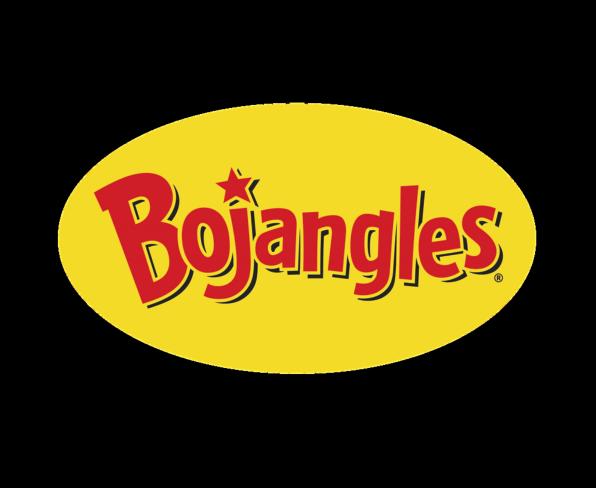
or businesses like yours to say, ‘Hey, what are you guys doing in this situation? How are you handling it? What are the changes that you’ve made?’ It’s all on you.”
Once the pair were comfortable, they moved forward quickly. “We had the meeting in June,” he says, “and then I think we went to do our visit in September, and then I think we signed in October.”
The pair operate two locations, Class 101 Mid-Cities in North Richland Hills and Class 101 Alliance in North Fort Worth. The new location, Class 101 Flower Mound, was expected to open in August.
As they’ve grown their business, they’ve learned to appreciate another benefit of working with an emerging brand. New franchisors encounter novel situations, and the Overcashes and other franchisees can help decide the way forward.
For instance, their territories are within 30 minutes of each other. All territories have brick-and-mortar locations for regular meetings, but each territory is expected to have a large testing facility. Since students only needed to visit the testing facility two times over their two to five years of service, the Overcashes asked to use one centralized location for all three territories. The company approved.
“I’m not sure that would have been the same situation or scenario had the brand been established and not an emerging brand that’s learning along with us,” Melissa Overcash says.
A DISRUPTOR
Nicholas Marco brought considerable experience when he was thinking about going into business with an emerging brand. His father, John Marco, is a founder of Hand & Stone Massage and Facial Spa and encouraged his son’s entrepreneurial drive.
“I’ve been so fortunate to learn through what will be the 20-year history of Hand & Stone this November. It has really prepared me well to oversee operations of other brands,” Marco says.
He owns 11 Hand & Stone Massage and Facial Spa locations in his home state of New Jersey, and he’s a regional developer for the company in Ohio, where he supports 21 locations. Marco also has two open Drybar locations and another eight in the pipeline.
In addition, Marco hosts a podcast, “The Opportunity Coach,” so he can share his knowledge of the business world with others.

Marco says he tends to walk into any business and wonder, “Is this a business I want to own?”
He was interested in adding a fitness brand to his portfolio and talked with different companies but never reached the point of signing on the dotted line. His experience told him conditions weren’t right.
Things changed when a friend introduced him to Sweat440 in February 2022. “She’s like a queen of fitness. She does every workout that exists,” he says. “And she lived in Miami at the time, and that is where Sweat440 started.”
Marco says he had a great workout, and he could tell Sweat440 had a solid following. He was impressed by how new classes started every 10 minutes, so members could exercise on their schedules. It took away a reason to say no. If someone missed the 7 a.m. class, they didn’t have to wait until 8 a.m.; they could start at 7:10 a.m. Marco saw how that increased flexibility for members could potentially increase revenue.
“I thought that this was a disruptor in the fitness world,” he says. “I also loved the workout, so it was enough to make me feel really excited about it.”
At the time, there were roughly 15 Sweat440 locations open. Marco says he connected with Cody Patrick, the CEO and co-founder of the brand, and that increased his comfort level.
“In April 2023, we did the grand opening of my first Sweat440, which was definitely a huge success,” Marco says. “We opened with 275 members. I thought that was remarkable considering that nobody in the entire state of New Jersey, unless they happen to visit South Florida, knew the brand.”
As a franchisee, he’s now part of the Sweat440 team and plans to share his input as the company develops. Rather than always
following the franchisor’s lead, Marco says he appreciates a collaborative relationship.
“When you come into a very established brand, and you don’t necessarily have a connection with them, it can be a little harder. You don’t have a more direct line to the people who are involved in the decisions,” Marco says. “With a new brand, it’s a little bit easier because the team is so small. That definitely drives me. It’s a bit risky, but this is the time when they determine their destiny.”
Emerging brands offer their own mix of risks and benefits. Here are some tips from operators who decided that the potential positives outweighed the negatives:
“Speaking to people in franchising to help you evaluate the decision is important. I’ve learned that there’s nothing like talking to somebody who’s already walked down the path you’re about to walk down because you don’t know what to look for.”
Nicholas Marco, Sweat440
“Getting to know the corporate team, especially with the little experience that we have in franchising, is definitely important for us.”
Zach Trujillo, Vicious Biscuit
“Looking back, I would have wanted to know what the cost per acquisition is.”
Casey Furtado, Apex Leadership Co.
“If I have a trust in that brand, I’m going to encourage people to go with the emerging brand, so it’s very easy to work with them and more cost effective.”
Hemant Patel, Cilantro Taco Grill
“You need patience and understanding. An emerging brand is an ever-changing process as they begin to grow. Not everybody likes change very much.”
Mark Overcash, Class 101


































$1.3MM+ AVERAGE GROSS SALES* Discover Good Vibes and Great Operations with Potbelly







32 States 430+ Shops




47 Years DOUBLE-DIGIT SAMESTORE SALES GROWTH EXCELLENT SALES-TOINVESTMENT RATIO
SEASONED LEADERSHIP TEAM WITH 150+YEARS OF COMBINED EXPERIENCE


Written by JOHN DIJULIUS
Editor’s note: The following is an excerpt adapted from the new book, The Employee Experience Revolution: Increase Morale, Retain Your Workforce, and Drive Business Growth.

Asurvey by Robert Half in 2018 found that 28% of workers admitted to having accepted a job offer but then backed out before their start date. Additionally, a 2019 study by Randstad USA reported that 43% of workers had ghosted an employer by not showing up for the first day or by stopping communication altogether.
Many companies miss an incredible opportunity to capitalize on the new employee’s excitement of starting with a new organization. A lot of things can occur during the radio silence from the time they accept the position till their first day of work. They can receive other offers. They could get cold feet and start second-guessing. This can lead to what Joey Coleman refers to as “hire’s remorse” in his book Never Lose an Employee Again
The prestart phase is where you can demonstrate how your culture is like no other they have ever experienced. Jump-start their employee morale and excitement about this new chapter of their professional career and their life.
Coleman calls this the “Accept phase,” which “offers the chance to capitalize on the euphoria associated with this offer and acceptance while creating a memorable moment at the instant the candidate becomes an employee. When a candidate accepts your job offer, you must show them how excited you are and make them feel wanted. Many organizations fail to see the opportunity to create a milestone memory in the actual extending of the job offer: a feeling of being wanted ... stop and consider the times in your life when someone let you know they wanted you.”
This is where it gets really interesting. Coleman shares, “When a prospective employee decides to accept your job offer, a physiological reaction takes place in their body. Brain science shows that when a prospective employee moves from a state of consideration to a decision to accept an offer, a chemical is released in the brain. Dopamine floods the gray matter, creating an emotional euphoria. The newly minted employee feels excitement and joy because their job search is over. They believe they have found what they were looking for all along. In this euphoric state, an employee is filled with hope for their future. They anticipate continued growth and learning, the chance to contribute to a larger cause or mission, possibilities of advancement, new challenges, and exciting opportunities. They plan to meet new people, do new things, be exposed to new situations, and achieve new things.”
“At this key moment in the relationship— when both parties are thrilled that the search is over, and a decision has been made—the employer and employee often communicate asynchronously. An email or letter is sent, a decision is made, and an email or letter is sent back. Asynchronous interactions usually don’t feel celebratory, and such an important occasion deserves to be celebrated. Don’t miss the chance to capitalize on your new employee’s excitement—and join them in the jubilation!”
says Coleman. He concludes, “Magnifying the excitement and enthusiasm around a new employee joining your team gives them a boost of confidence that they made the right decision. Promoting their commitment to your organization publicly celebrates the new hire and builds broader interest in your enterprise. Using social media platforms to creatively announce new team members highlights your ongoing hiring efforts and praises your new team member in the same message.”
David Burkus, author and professor, shares several tips on creating some special moments even before a new employee starts. “The first tactic to make new employees feel welcome is a before-the-start-date teaser email. You’ve been interacting [with] new hires during the interview process, and you know their contact information, and you know a lot about them. So, before their first day on the job, preferably just a day or two before their start date, send them a quick email sharing how excited you are for them to join the team. Mention specific information you recall from the interviews and connect it to the work your team will be doing. Just that simple message can help them focus on what they’re looking forward to and help them feel cared for and understood even before you’re technically their team leader.”
Burkus continues, “The second tactic to make new employees feel welcome is an ‘enter-view.’ This is sort of the opposite of the interview process. Instead of the new hires telling the team about themselves, it involves the team telling the new hires how excited they are to welcome them. Ideally, members of the team were involved in the hiring process, and this enter-view is the chance for them to draw from what they remember to share why they’re so excited for their new teammate. Enter-views work best when done in person early on the first day, but it could also be done by bombarding new hires’ desks or email inboxes with positive messages throughout the day as well.”
John DiJulius III, author of The Customer Service Revolution, is president of The DiJulius Group, a customer service consulting firm that works with companies, such as Starbucks, Chickfil-A, Ritz-Carlton, Nestle, PwC, Lexus, and many more. Contact him at 216-839-1430 or info@thedijuliusgroup.com.


Written by MARY LOU ATKINS
As leaders, we are charged with providing an environment that inspires and allows employees to contribute and grow. Employees may come to you for a job, but if you create an environment where they can contribute and feel welcome, they will stay because of the culture and feeling like they belong.
When you belong, your contributions matter. What you do is appreciated. You are connected, and you want to do your best each and every day. Ask yourself, how do you make your team feel valued? Are you reminding them of how they contribute to the success of the business? Do you focus on building their strengths versus trying to improve their weaknesses? Do you know their strengths or even what your strengths are?
A free assessment from TMBC (The Marcus Buckingham Company) will help you and your team figure out your strengths and how to be your best self. Visit https://standout.tmbc. com/assessment/ to launch the assessment, and share the link with your team, so they can try. Everyone will receive a full report on their strengths after completing the assessment. The report will include details on how to make an immediate impact, so team members can take their performance to the next level.
If you need ideas on how to tap into your team’s strengths, here are some practical ways to help you do that:
• Observe your team while they are working. Talk to them about their strengths. They may not be aware of their strongest talents.
• Put together work plans based on each person’s strengths.
• During team meetings, have the team share their top two strengths. This will help build team trust through understanding how each person’s natural tendencies show up each day and how they approach different situations. The goal is for your employees to learn from each other’s abilities and allow them to work as a team.
• Make a commitment to deliver positive feedback and celebrate successes.
When our team knows that we care and their strengths are valued, they are committed, proud, and excited to be part of the organization.
Mary Lou Atkins, sHRBP, is the vice president of human resources at Chicken Salad Chick. She is a seasoned and strategic HR executive with 40-plus years of experience in the restaurant industry. She is skilled in talent and performance management as well as employee relations. She joined Chicken Salad Chick in 2019 as human resources director after previously holding various positions within operations, training, and HR at Popeyes Louisiana Kitchen for 35 years.

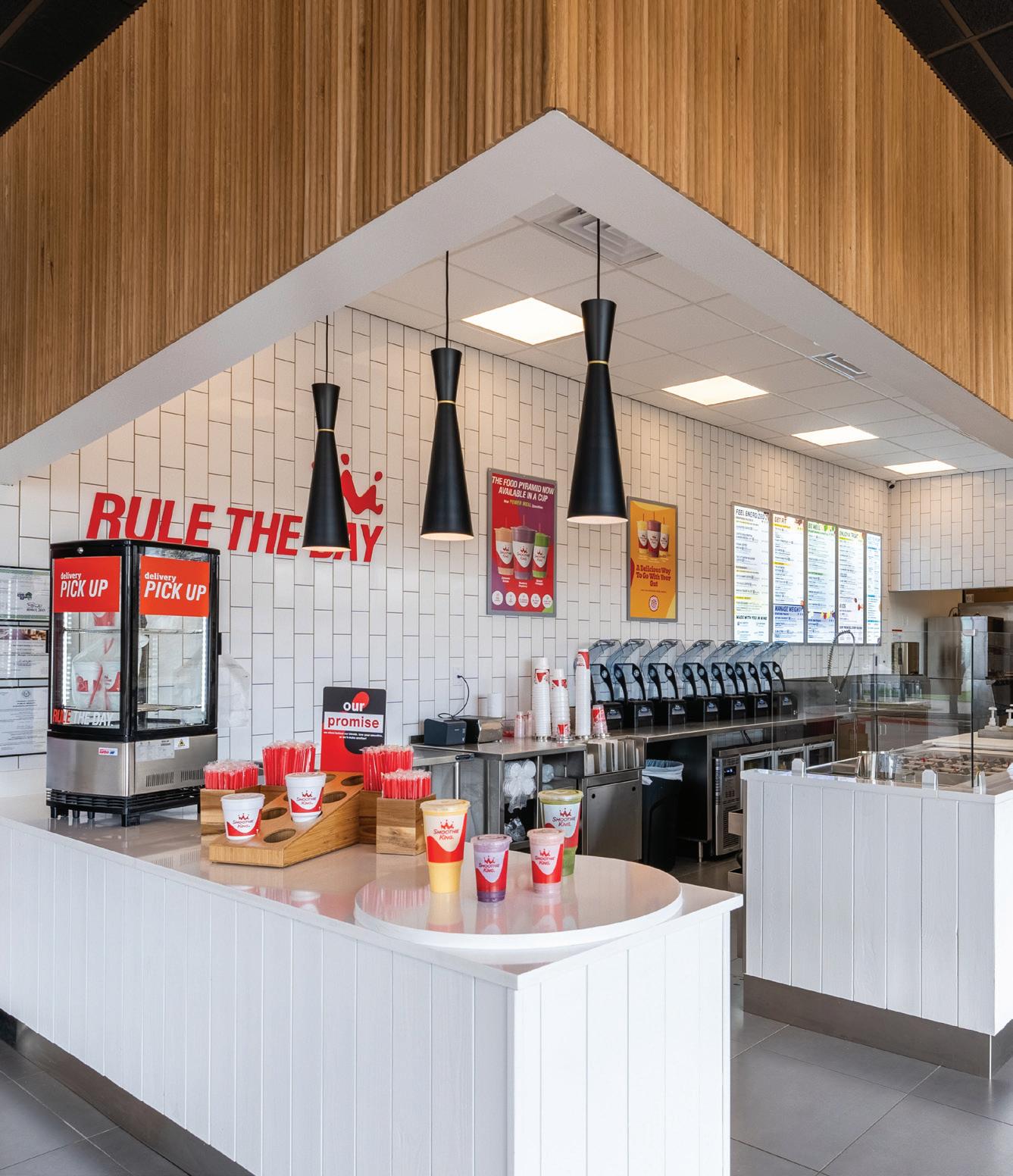
































Written by LARRY LAYTON
Imagine the potential for growth and success in multi-unit operations where the owners and managers hold the key to driving profits. Yet, why are they often the least prepared to drive profitable growth?
The disconnect is a pressing issue for franchise owners. They find themselves grappling with low profits and being trapped in the dayto-day operations with little time to focus on the bigger picture. This is a clear sign of a critical skills gap in the multi-unit franchise business model that demands immediate attention and action.
The problem
Some people are just great operators. They run a tight ship, pay attention to detail, embrace the ops manual, and know exactly what it takes to run a great location. These individuals rise through the ranks based on their success in managing a single location. Overseeing multiple locations brings new challenges requiring new skills and financial know-how. Unfortunately, these owners and managers are often elevated to multi-unit responsibility without the necessary preparation, leading to frustrating disconnects for managers, their direct reports, and the investors who expect them to build profitable operations.
Of course, there is a financial and leadership skills gap. We prioritize training for frontline employees and single-unit managers, preparing them to master the required tasks responsibly. Then, we assume these skills will make them good at managing others.
News flash! It is a common misconception that task mastery automatically translates to effective leadership. The reality is that without comprehensive training, we’re setting up our multi-unit managers for failure. The shortterm cost-saving measure of not providing this training leads to long-term inefficiencies and operational challenges, which can significantly impact the bottom line.
A systemic issue
Multi-unit owners and their managers ensure
consistency, quality control, systems compliance, and employee engagement across multiple locations. Most importantly, they must orchestrate those elements to drive profitable growth. This requires resources, strong communication, a structure of goals and accountability, and coaching skills. Without proper training and resources, these overwhelming responsibilities lead to burnout and high turnover, destabilizing field operations and compromising profitability. We repeatedly see great operators fail as multi-unit managers.
One or two bad experiences may lead you to believe you hired wrong. Sorry. The recurring nature of this problem underscores a systemic miss within operations: promotion without preparation. Effective multi-unit management requires:
• A strategic mindset that combines operational expertise with coaching, communication, and leadership skills
• Basic financial acumen, including breakeven analysis, profit-driven goal setting, and knowing how to align KPI targets with desired financial outcomes
• A strong organizational culture that motivates managers to drive profitable growth because profit is not optional
The solution
Shift how you approach your resource allocation, recognizing the critical role of multiunit managers. Invest in training to fill the knowledge gaps, provide information to keep people on track, and invest in employee development platforms to support efficient team development. Here are my three must-haves for enhancing multi-unit manager effectiveness:
1. Comprehensive training programs
• Operational training. Use the best logistics and time management practices and rely on strong processes and systems that drive operational controls and quality assurance.
• Leadership and management training. Focus on strategic thinking, coaching techniques, and team development.
• Financial training. Equip multi-unit owners and managers with the skills to use KPIs, financial statements, and budgets to lift profits and get financial control over their operations.
2. Advanced data analytics and reporting tools
• Business intelligence software. Aggregate data from all units, providing robust benchmark insights into sales trends and operational efficiencies.
• Real-time reporting. Get instant access to KPIs, enabling remote oversight and informed decision-making.
• Predictive analytics. Forecast trends for proactive inventory management, staffing, and marketing efforts.
3. Employee development platforms
• Learning management systems. Provide ongoing training opportunities to ensure consistent service quality.
• Performance management tools. Track employee performance compared to goals and facilitate regular feedback and development discussions.
• Onboarding programs. Ensure new hires are quickly integrated and trained to maintain high operational standards. The first day is the most important day of any employee’s tenure.
To make a shift, assess your organization’s appetite for change. Dissatisfaction with the status quo is a force that drives change. Welltrained, well-resourced multi-unit managers are the secret sauce for unit profitability.
Adopt a continuous improvement culture. The best knives require sharpening when they get dull. Let’s face it: A group of dull knives in your operation is a sure recipe for failure.
If profits are not optional, neither should the comprehensive training and preparation of the key players responsible for driving these profits. Investing in the education and development of multi-unit owners and managers is not just a smart strategy; it is essential for sustainable success.
Larry Layton, CFE, is the newest Profit Soup team member. His insights as a hands-on operations executive, business consultant, and business owner bring new depth to the Profit Soup team.




Written by JACK GRESPIN
Investing in up-and-coming franchise brands can offer a prime opportunity for franchisees seeking to harness innovation and drive growth within the multi-unit industry. Often, the franchisee’s core brand has limited ability to expand, the economic model has evolved, and the franchisee can diversify. Opportunities are significant for established franchisees, and growth-minded companies generally have both human and financial resources to access when considering additional brands and growth outside of their core operations. As a result, we see more and more established franchisees taking on a second, third, or even fourth brand to drive growth and diversify their revenue streams. Is this strategy right for your company, and what factors should one consider when investing in a new concept?
Newer brands, which are less known compared to established names, present considerable growth potential due to their limited locations, significant development green space, and being first into a new market. Their appeal often lies in unique dining concepts, innovative service approaches, or distinctive consumer experiences that set them apart from established chains. Essential traits of these brands include a focus on innovation, significant growth potential, adaptability, and an entrepreneurial mindset. Although still developing, these brands typically offer comprehensive training, support, and resources to franchisees to facilitate their success. Often, emerging brands have a better unit economic model than established brands and usually offer newer, more enticing and flexible footprints that can result in lower development costs.
Thorough market research is critical when considering an investment in emerging franchise brands. Understanding the competitive landscape is vital to assess how the brand differentiates itself and whether it holds a sustainable competitive advantage. Customer reviews and
feedback provide invaluable insights into the brand’s market acceptance and highlight potential areas for improvement.
Additionally, financial health and growth forecasts are key elements in the decision-making process. Investors need to meticulously review financial statements to evaluate the brand’s financial stability, focusing on revenue growth, profit margins, cash flow, and other indicators. It’s critical to the review process to understand the brand’s ownership, long-term strategy, and financial resources.
As one evaluates the growth and profit potential of the new brand, focus on due diligence with existing franchisees in the brand. Are they happy? Are they satisfied with the brand’s leadership, direction, etc.? Most importantly, are existing franchisees building and growing new sites, and would existing franchisees invest if they could do it over again?
Aligning an emerging franchise brand with your personal and company goals and capabilities is essential. What is the time period for your investment? Does second-generation ownership supervise the new brand? Have a growth, human resource, and financial plan completed before the investment. Be careful in diverting too many assets, both financial and human, from the core brand.
Diversification within your franchise portfolio can significantly mitigate risks and enhance growth potential. By investing in a variety of franchise concepts, you can spread risk across different market segments and consumer bases. For instance, combining a chicken concept with a burger brand or a casual dining concept can provide balance and stability. Each type of franchise offers unique advantages and faces distinct challenges, so a diversified portfolio allows you to capitalize on different trends and market conditions.
Diversifying also provides a buffer against sector-specific downturns. If one segment ex-
periences a slowdown, others in your portfolio might perform well, stabilizing overall returns. Additionally, exposure to various operational models and consumer demographics can provide valuable insights and cross-promotion opportunities, enhancing the overall resilience and growth potential of your investments.
Investing in emerging franchise brands inherently involves risks. To make informed decisions, it’s crucial to recognize potential challenges and risks. Developing contingency plans to address possible issues, understanding brand-specific hurdles, and having an exit strategy if the investment does not pan out are essential steps. Being comfortable with the size of the investment and understanding the associated risks can help mitigate potential downsides.
Despite the risks, there are significant advantages to investing in emerging franchise brands. The potential for growth and expansion is considerable, offering early investors the chance to benefit from the brand’s growth trajectory. Flexibility in responding to market feedback and evolving trends supports continuous improvement and innovation. Moreover, franchisees often gain more influence and control over the brand’s direction, promoting a collaborative and entrepreneurial environment. Additional brand investment also provides new and different opportunities for employees and often second-generation management. Several of our clients have invested in second brands with younger family members managing the new brand successfully.
Investing in emerging franchise brands can be highly rewarding for those prepared to take calculated risks and conduct thorough due diligence. By understanding market dynamics, evaluating financial health, assessing brand potential and scalability, and aligning the investment with personal goals and capabilities, investors can make strategic choices that align with their financial aims. Emerging franchise brands represent the future of culinary innovation and growth, making them an attractive option for astute investors.
Jack Grespin is a vice president with C Squared Advisors, a boutique investment bank that has completed hundreds of transactions in the multiunit franchise and restaurant space.





Written by CAROL SCHLEIF
Astudy of institutional investors conducted by Greenwich Associates in 2015 found that more than three-quarters of the managers of the world’s largest asset pools (e.g., pensions, endowments, sovereign wealth funds) regularly used social media as part of their normal workflow processes. This may seem surprising, given the ever-evolving nature of the media and the notion that “everything changes all the time.” Yet many in the survey pointed to the importance of the medium as a way to generate ideas worthy of further research or to keep a finger on the pulse of public opinion and emerging trends.
Does social media have a place in helping us shape and manage our personal portfolios? Maybe. Maybe not. The answer lies more in how you are personally wired and how you deploy social media. There are many solid commentators on social media, the Internet, and podcasts who can bring us a deeper education on a broad variety of topics: economics, specific asset class insights, the workings of the Federal Reserve, politics, entrepreneurship, financial planning, taxes, and more. For us lifelong learners, the array can be so overwhelming as to become all-consuming with rabbit holes aplenty! Taken as one set of inputs in a sturdy and thoughtful portfolio construction process, social media platforms and other internet sites may have a place.
On the other hand, there are plenty of ways to be led astray by incorrect information or inputs meant to inflame our emotions rather than feed the rational parts of our brains. One only has to look as far as the meme stock craze, which has reemerged as an example of the former. Putting on a trade because someone else
did (especially if the whole reason it was placed was based on “sticking it” to someone else) is hardly a viable long-term investment strategy. At its core, investing wisely for the long term is about leveraging the benefits of compounding—not buying a lottery ticket or winning at the blackjack table. It is also important to remember that everyone’s situation is unique, and what works for your best friend, your sister-in-law, or your work bestie may not have any place in your own financial affairs.
“The first rule of social media is that everything changes all the time. What won’t change is the community’s desire to network.”
—Kami Huyse, public relations and social media strategist, entrepreneur, and CEO of Zoetica
If you plan to use social media and other sources for investment research, keep these ideas in mind:
• Research the background, experience, training, and credentials of the person giving the advice.
• Find out if they are being paid to offer their opinions/expertise. If so, by whom?
• Are you prone to emotional responses to triggers? If so, limit the time spent or access to sites and information flows that demand, command, incite, or encourage action. Lawsuits were brought against early trading apps for gamification (throwing confetti) every time a trade was placed. The algorithms in your feed are trained on your activity—what you like, click through, read comments on, or even hover over.
• There are plenty of reputable free sources for basic information, which are great places to start learning basic economic information. One example is the U.S. Federal Reserve System. The Fed and the regional Feds conduct extensive research and publish extensively on a vast array of topics important to all businesses.
• Make sure to write your investment goals down before looking for ideas or suggestions more broadly. Growing your personal net worth, similar to growing your business, takes time, diligence, sound and experienced advice, patience, and potentially some trial and error. While social media influencers can provide investors with interesting ideas, staying true to your long-term plan and well-diversified portfolio, rather than reacting to the latest investing trends on social media, is typically a better approach for investors.
Carol Schleif is chief investment officer at BMO Family Office. “BMO Family Office” and “BMO Wealth Management” are brand names used by BMO Bank N.A., BMO Family Office, LLC, and certain affiliates providing investment, investment advisory, trust, banking, and securities products and services. These entities are all affiliates and owned by BMO Financial Corp., a wholly-owned subsidiary of the Bank of Montreal (BMO). Investment products are not FDIC insured, not bank guaranteed, not a deposit, and may lose value. To learn more, visit www.bmofamilyoffice.com. Views and opinions expressed are Schleif’s and do not necessarily reflect the views and opinions of BMO.






Written by MATTHEW HALLER
Even in a country divided politically, one thing can unite us all: The state of franchising remains strong. The growth of our model continues to outperform the broader economy, creating upward mobility and countless opportunities for individuals, families, and communities.
At the International Franchise Association (IFA), we have been working in overdrive to protect, enhance, and promote franchising.
The road hasn’t been easy. Working alongside our partners and members, we have slayed a “three-headed monster” of policy threats. These efforts have created a better environment for our franchise community, which will always remain our North Star.
First, there was the threat of joint employer. The National Labor Relations Board (NLRB) made clear it intended to replace the workable 2020 joint employer standard with the previous administration’s version—the one that cost franchises $33.3 billion per year, eliminated hundreds of thousands of jobs, and increased lawsuits by 93%.
When the joint-employer proposal arrived, we hit back with a comprehensive two-track plan. First, mobilizing our members and congressional champions, we helped push a repeal effort—known as a Congressional Review Act—which passed both chambers of Congress in bipartisan fashion.
When President Joe Biden issued a misguided veto, the second track of our strategy bore fruit: A federal judge in the Eastern District of Texas struck down the expanded joint employer, citing the NLRB’s overreach and the economic consequences the rule would bring. But that's no longer a concern. In July, the NLRB withdrew its appeal of the ruling. The appropriate 2020 joint-employer rule remains the law of the land, and that’s a positive for franchising.
The second head of the monster was California’s Fast Food Recovery Act (AB 257), one of the most detrimental bills franchising has ever faced, singling out the state’s thriving quick-service restaurant sector and paving the way for sectoral bargaining.
Despite the Golden State’s unfriendly business climate, we helped mitigate the most problematic components of the legislation, most notably removing the joint-employer provision (AB 1228). The power of the unelected fast-food council was watered down, and the minimum wage was reduced from $24 to $20.
While the damage could have been worse, the implementation has been harmful. During the first two months of the $20 wage hike, at least 10,000 jobs were lost.
Finally, there is the Federal Trade Commission (FTC), which, under the leadership of Chairwoman Lina Khan, has aggressively targeted a slew of companies and industries. In March 2023, the FTC opened a Request for Information (RFI) on franchise agreements and franchisor business practices. By the nature of the questioning, it was clear that the effort was designed to elicit negative responses toward franchising.
To proactively address the FTC’s concerns and offer a constructive path forward, IFA assembled working groups of franchisors, franchisees, and suppliers along with attorneys, consultants, and third-party franchise sellers. The groups focused on improvements to the presale process. Over the course of a year, we developed a series of commonsense policy recommendations to strengthen the business model.
The guiding principle of these recommendations is providing a prospective franchisee with key information necessary to conduct due diligence aligned with the significance of their investment before making a franchise purchasing decision.
Those who attended our 2024 Legal Symposium in Washington heard about our Responsible Franchising principles and how these new recommendations are critical components of that effort. They are a concrete example of staying on offense to proactively tell our story and set our policy goals on our terms, rather than let our opponents define the rules of the game.
As U.S. Rep. Kevin Hern, R-Okla., co-chair of the Franchise Caucus and keynote speaker at our Legal Symposium, wrote in a recent op-ed for The Hill, “Policy recommendations put forward by the International Franchise Association, the official trade organization for franchises, offer commonsense improvements to the presale negotiations between a franchisor and prospective franchisee—all to help the franchisee understand exactly what they’re investing in.”
The future of potential FTC changes hangs in the balance of the November election, but whatever happens, we will continue advocating for Responsible Franchising because it is imperative to the future of the business model.
After all, the threat level remains high. Rest assured that we will stay proactive and vigilant against the Department of Labor’s overtime rule and its new independent contractor standard as well as continued threats on the state level brought forward by our opponents. We will also keep telling your stories to the world. Doing so will create a better environment for your businesses to thrive, which is our job and top priority.
There is no better time to do this than in Washington, D.C., this September at the IFA Advocacy Summit. Join us—just months before this year’s pivotal election—to make sure lawmakers hear directly from you before making changes that can define the way you do business.
Franchising is the ultimate American business model, and we need to ensure it stays that way.
Matthew Haller is president and CEO of the International Franchise Association.

Perspire Sauna Studio is the leader in infrared sauna wellness with 14 years of industry expertise and the most significant footprint. Benefit from our years of experience, singular focused support system, and exclusive partnerships.


Written by PAUL WILBUR
Just in the past two years, eight new franchise brands have emerged in the pickleball industry, driven by skyrocketing consumer demand, diverse business models, and robust growth projections. More brands are to come certainly.
FRANdata has recently studied this growing sector. We found that these brands offer a compelling opportunity for franchisees because of their extremely fast growth trajectory, but just as interestingly, they offer a variation in revenue models that provide the franchisee with options.
The Picklr
Dill Dinkers
PKL
Pickle Rage
Crush Yard
The Pickle Pad
Pickleball’s rapid ascent in popularity is nothing short of remarkable. According to the Sports & Fitness Industry Association, more than 13.6 million people played pickleball across the U.S. in 2023, marking an 85.7% year-over-year increase from 2022. This surge is primarily attributed to the sport’s accessibility and appeal across various age groups. Initially popular among older adults, the average age of pickleball players has decreased from 41 years in 2020 to 38.1 years in 2021, reflecting its growing appeal among younger demographics.
The Covid-19 pandemic further accelerated pickleball’s popularity as a socially distanced activity that allowed people to stay active and
socialize safely. Cities across the U.S. have responded to this demand by converting tennis and basketball courts into part-time or fulltime pickleball venues. The participation rate of pickleball increased by 159% from 2019 to 2022, making it the highest for any sport in the U.S.
These emerging pickleball franchises are in aggressive growth phases with projected unit growth reflecting strong investor confidence. Together, these eight brands project to add more than 1,000 units this year and next. Most of them are looking for relationships with multi-unit franchisees.
For example, Ace Pickleball has recruited franchisees from established brands like Hand & Stone Massage and Facial Spa, Orangetheory Fitness, and Papa Johns. It has already successfully signed up 24 different franchisees to open 86 locations. The Picklr announced in April that it sold 276 total units to 36 unique direct franchising groups and is looking to develop in Canada. Similarly, Pickleball Kingdom plans to expand to more than 140 units and has recently signed up with a developer in India.
One of the things that makes this industry interesting is that it is characterized by two primary business models: court focused and entertainment driven.
This model prioritizes sports and fitness enthusiasts by focusing on pickleball courts and maximizing occupancy. Facilities typically feature eight to 15 courts with revenue driven by court occupancy through membership models and pay-per-use options. Brands like Ace Pickleball and The Picklr exemplify this model, offering limited food and beverage options but focusing heavily on the sport itself. This
model benefits from recurring membership fees, similar to established fitness concepts, and allows for rapid national expansion due to its straightforward operations and low initial investment costs.
This model combines pickleball with food, beverage, and other entertainment activities, creating a more diversified revenue stream but requiring larger real estate and more complex operations. Brands such as PKL and Crush Yard exemplify this approach, offering extensive kitchen setups and dining areas in addition to pickleball courts. While this model provides a unique dining and entertainment experience, it demands greater expertise from franchisees to manage both fitness and food-service operations effectively.
The investment for each of these models varies significantly, and though these brands are still new enough not to have consistent returns, early statements imply that AUV for the entertainment model is three to four times that of the court-focused model. Time to develop, ease of financing, and time to see a return will vary.
The pickleball industry presents a compelling opportunity for multi-unit franchisees due to its explosive consumer demand, adaptable business models, and significant growth projections. As a sport that appeals to a broad demographic, pickleball offers a unique blend of fitness and social interaction, making it a lucrative investment. Franchisees can choose between court-focused and entertainment-driven models, each with its advantages and challenges, to best align with their expertise and market strategy.
With the sport’s popularity showing no signs of slowing down, now may be an ideal time for savvy investors to capitalize on the burgeoning pickleball market. Whether through dedicated pickleball clubs or integrated entertainment venues, the potential for success in this dynamic and rapidly expanding industry seems to be immense.
Paul Wilbur is COO of FRANdata, where he is instrumental in building the company’s research and consulting framework. He manages the research, information management, marketing, and IT departments and plays an integral role in the strategic development of FRANdata’s suite of franchise solutions. Contact him at 703-740-4700.



IFA ADVOCACY SUMMIT
September 9-11 | Washington, DC
FRANCHISE LEADERSHIP AND DEVELOPMENT CONFERENCE
October 16-18 | Atlanta, GA
Partnership event with Franchise Update Media
EMERGING FRANCHISOR CONFERENCE
November 18-20 | Austin, TX

IFA Annual Convention
February 10-13 | Las Vegas, NV
International Franchise Show London
April 11-12 | London, England
Partnership event with MFV NSE
Legal Symposium
May 4-6 | Washington, DC
IBA/IFA Joint Conference
May 6-7 | Washington, DC
Franchise Customer Experience Conference
June 24-26 | Atlanta, GA
Partnership event with Franchise Update Media
IFA ADVOCACY SUMMIT
September 15-17 | Washington, DC
FRANCHISE LEADERSHIP AND DEVELOPMENT CONFERENCE
October 7-9 | Atlanta, GA
Partnership event with Franchise Update Media
EMERGING FRANCHISOR CONFERENCE
November 10-12 | Nashville, TN

Scan here to learn more about these events and plan your year with IFA!




















SEPT. 6 - 7, 2024
SEPT. 6 - 7, 2024
Fort Lauderdale, FL
Fort Lauderdale, FL




FEB. 28 - MAR. 1, 2025
FEB. 28 - MAR. 1, 2025
Los Angeles, CA



NOV. 15 - 16, 2024
NOV. 15 - 16, 2024
Austin, TX
Austin, TX
APR. 4 - 5, 2025 Charlotte, NC
Los Angeles, CA APR. 4 - 5, 2025
MAY 29 - 31, 2025
MAY 29 - 31, 2025 New York, NY
New York, NY









